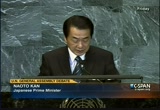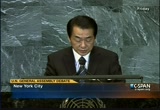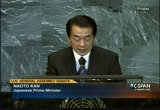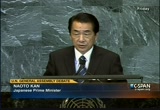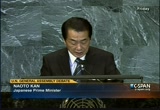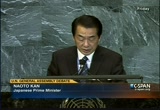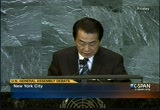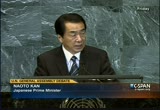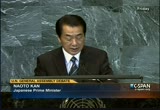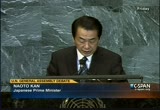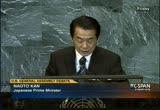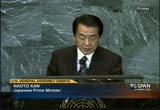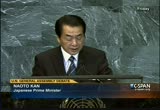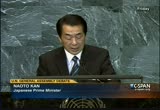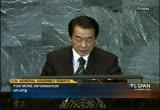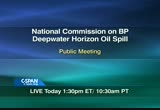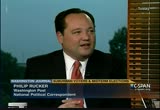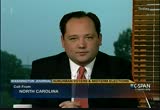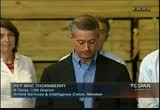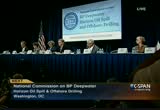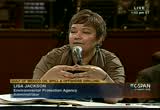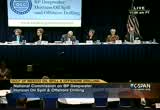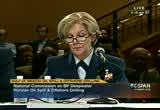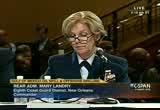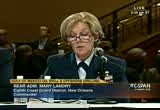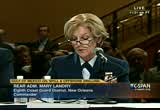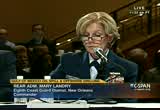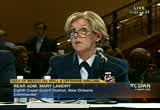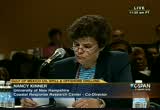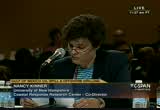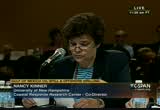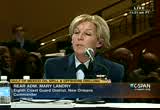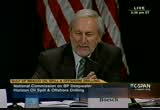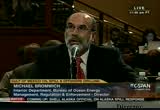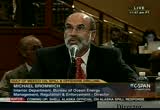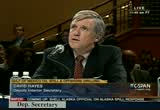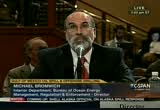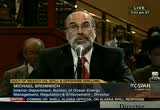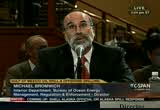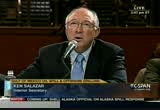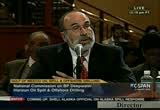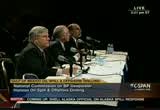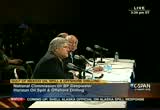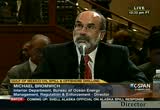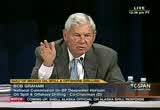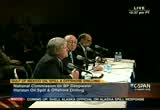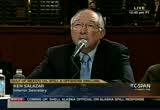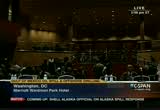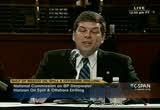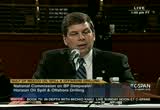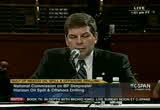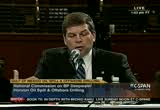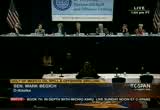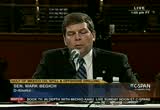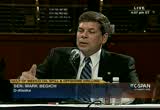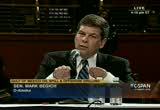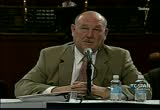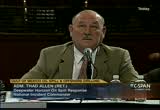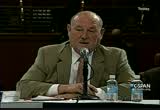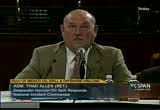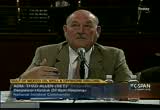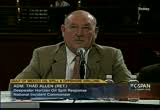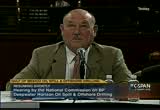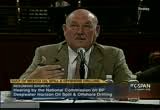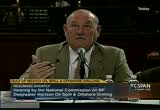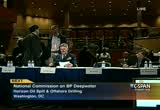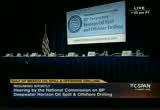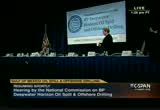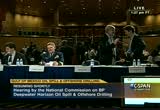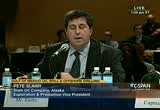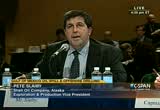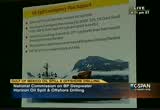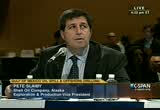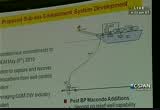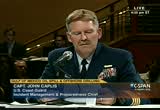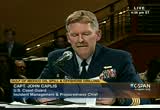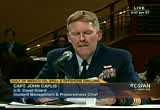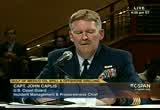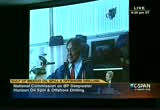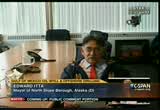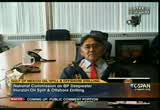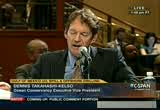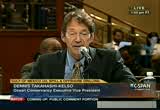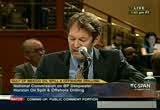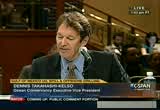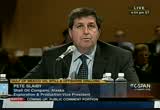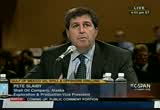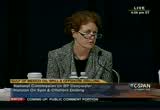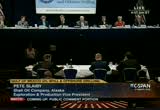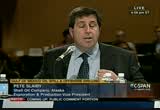tv U.S. House of Representatives CSPAN September 27, 2010 12:00pm-5:00pm EDT
12:00 pm
the second area of contribution is the global environment. at the u.n. summit on climate change last year, japan announced the target of reducing its emissions by 25% by 2020 compared to the 1990 level. an international framework where all economies framework where all economies prosper the small island states are faced with a result of the
12:01 pm
climate change. aiming at adopting a new and legally-binding policy, japan will work with other nations to lead international negotiations for a success in 2016 at the end of this year. we will also steadily support developing countries that are vulnerable to the negative impact of climate change. we are taking medicating measures such as reducing emissions with partnerships between the public and private sectors. next month, will be confirmed in japan. at this meeting, we must come to an agreement on commencing new
12:02 pm
actions in order to halt the rapid progress of by a diversity. the biggest challenges in this field are setting a common global action target and establishing a new international regime in the area of access and benefits sharing as related to genetic resources. as chair of the meeting, japan is determined to play an important role in these efforts. mr. president, a third area of contribution is nuclear disarmament and nonproliferation. i believe the invention of the nuclear weapon and threat to the survival of the human race the hangman's doing, the solution to the problem must be within the reaches of man. japan is the only country that has suffered the devastation of an atomic bombing. we have the moral responsibility
12:03 pm
to take concrete steps to realize a world without nuclear weapons. japan is determined to lead the international community in these endeavors. in hiroshima and nagasaki every year for the past 55 years, services have been held to pray for a world without nuclear weapons. secretary general visited japan this year and was the first secretary general to attend the ceremony and to visit nagasaki. i would like to thank the secretary general once again for making this visit. at the hiroshima ceremony, a representative from the united states was in attendance along with a representative of other countries. i very much welcome that decision which will contribute to raising the momentum toward a world without nuclear weapons.
12:04 pm
in japan -- japan bears the responsibility to all humankind to hand down to future generations and awareness of the catastrophic nature of nuclear weapons. with this objective, the atomic bomb survivors are special communicators for a world without nuclear weapons and i asked them to send out messages to the world about the horror of the use of nuclear weapons. only those with firsthand experience can convey this. japan will coordinate with other countries and civil society to promote education on disarmament and non-proliferation issues. last december, demand -- japan's amended renewed determination toward the total elimination of nuclear weapons which was adopted in the general assembly with the united states as a co- sponsor for the first time. japan is determined to continue its efforts to strengthen the trend of broadening support for
12:05 pm
the resolution in the international community. steady implementation of the agreement of the conference in may is essential. japan and australia have coasted foreign ministers meeting on nuclear disarmament and non-poor operation on the opening of a new general assembly session. we have launched a new group dedicated to working toward a world without nuclear weapons. we intend to deep in discussions on reducing the role and a number of nuclear weapons and the world. -- in the world. i must make reference to the democratic people's republic of korea and iran. their nuclear programs pose a threat to the international community. japan urges the dprk to take actions with council
12:06 pm
resolutions. steady implementation of the resolutions by all member states is essential. japan has not altered its intention to comprehensively confront the outstanding issues of concern for the unfortunate past and normalized relations in accordance with the japan-dprk resolution. it is absolutely indispensable. a dprk takes sincere steps such as implementing its agreement with japan, japan is ready to respond in kind. on the iranian nuclear issue, it is important for the international community to work in unity to implement firmly relevant security council
12:07 pm
resolutions and urged iran to take decisions. japan will continue to urge iran and make efforts to dispel the suspicion of the international community. we will also work together with the international community for a peaceful and diplomatic resolution of this issue. the fourth area of contribution is peacekeeping and peace- building. japan underwent reconstruction from the death and destruction of war and achieve economic growth is deeply aware of the importance and value of peace. our efforts in the area of peacekeeping and peace-building is a manifestation of our determination to act proactively toward achieving a true peace. there is a common assumption that peace-building activities in promoting health and education, industrial
12:08 pm
development, and employment are to begin after peacekeeping is concluded. however, in order to realize trapeze, it is imperative to work on peace-building efforts in tandem with peacekeeping activities from the earliest stages of the latter. in april this year, as president of the security council, japan hosted an open debate of the security council on post- conflict peacekeeping. japan will make efforts to use this approach for peace building and the world based on the suspect of a -- an issue of security. in haiti which was devastated by unprecedented damage following the tragic earthquake earlier this year, a team of engineers from japan's defense forces contributed to thepko efforts of recovery.
12:09 pm
in pakistan, we have defense forces providing assistance of international relief. we recently made a decision to send military liaison officers to the pko on the ground. japan will continue to actively participate in the un pko's and disaster relief operations. we will make concrete efforts in areas like investing in peace using oda providing assistance as pko training centers and developing human resources like training in asia. among all places and a world where peace building efforts are under way, afghanistan in particular is that a crucial stage. stage. at this moment, afghanistan
12:10 pm
poses the greatest challenge for the international community in peace building and it is to afghanistan that japan is providing its most intensive assistance. in cooperation with various partners, we have supported the afghan government in an integrative matter. there is improvement of security including police training, vocational training for rank- and-file soldiers and job creation and sustainable and self reliance development through cultural assistance and similar strategies. japan will cooperate with the republic of turkey in assisting afghan peace training and providing funding as well as supply personnel. we will reduce the security in the country.
12:11 pm
we recently disbursed 50 million u.s. dollars in assistance for the pre-integration insurgents. f. -- japan will provide assistance in such a way so that the people of afghanistan can perceive tender -- tangible improvements in their livelihood. i wish to stress the importance of un reform. the united nations is the only international group with the goal of promoting world peace and prosperity and ensuring a functional un that is capable of addressing diverse global issues of the most of most importance. to that end, all member states must work proactively to promote structural reform and functional reinforcement through the un. the united nations must continuously maintain the understanding and trust of member states by ensuring its
12:12 pm
own transparency and accountability. for the u.n., to confront global challenges, the role of the security council is particularly important and for them to be affected, it needs to have legitimacy by reflecting the current realities of the international community. international community. in that regard, we have informed that the security council is indispensable. japan is the only country that has ever suffered the devastation of atomic bombing and as a country that does not possess nuclear weapons, is well-suited to play a role in the security council in the 21st century. i wish to express once again japan is determined aspirations to take on further
12:13 pm
responsibilities for international peace and security as a permanent member of this security council. mr. president, japan is confronted at this time by various social and economic challenges including an aging society with a declining birthrate, fiscal problems, and energy dependency on other countries. these are challenges which i consider to be global because many countries are destined to face them sooner or later. it is my belief that japan will be able to contribute to the world by providing an innovative model through its own national experience in solving problems facing the world now and in the future. to death end as well, japan is determined to tackle these challenges aggressively. mr. president, compared with the
12:14 pm
magnitude of the responsibility for the future of mankind, the differences that divide nations are not great. i am convinced of that. everything rests on the decisions and actions we take today. let each one of us take a thought to heart as we begin the new session of the general assembly and seek to achieve good results and our efforts. thank you. [applause] host: caller: [captioning perfoy national captioning institute] [captions copyright national cable satellite corp. 2010] >> a federal panel is meeting today on the progress in the gulf of mexico oil spill. the afternoon session will be live here on c-span at 1:30 eastern time. if you missed any of the morning session, it continues all live
12:15 pm
now on c-span 2 or you can go to >> c-span.org. " the communicators" continues our look on privacy with a discussion on strike thing the federal law that limits personal data collection. that is tonight on c-span 2. >> the cspan video library is in the news this week. journalists on a deadline are using a not so secret source, the cspan video library with nearly every program since 1987. it is a great place to look for historical video or do educational resource. you will find it all free online anytime. >> this afternoon, a discussion on the 2010 midterm elections. white house senior adviser david axelrod will be there along with representatives from google,
12:16 pm
youtube, and facebook at 2:30 eastern. "washington journal" talked to a political reporter about the upcoming election. washington journal" continues. host: philip rucker is a correspondent for "the washington post." you travel to colorado earlier th month to talk to voters in the suburbs, where there are shifting opinions about the president. talk to us about what you found out abo that district. guest: we went to a subdivision called reunion, out near the airport of denver, about 20 miles outside of the city. brand new. a bill about six or eight years ago. -- built about six or eight years ago. this is wre democrats did well in the last two cycles. we saw this in northern virginia, suburbs outside philadelphia, outside of las vegas and phoenix, even, this is where democrats we able to win over voters with a common sense
12:17 pm
kind of agenda, practic approach to making the middle- class better. what we found is a lot of residents there are falling on tough times and switching their loyalties. they are not necessarily tea party people, so they are not angry -- i talked to about two dozen residents of the subdivision who were political independents, and they did not say anything hateful about the president or that they were voting the tea party but they were critical of the president. it's good he said they were not tea party identifiers. -- host: yu said that they are concerned about everyday issues that affect their lives. how important of the suburbs or this area of this country -- not urban america or rural america, more of a middle-class enclave. guest: it is critical for both
12:18 pm
parties. it is where the growth is. not necessarily the closed in suburbs that have been established for a while. these are the emerging bedroom communities outside the major methods but didn't -- metropolitan areas and neither political party can win without them. an expert we talked to said the battle of re-election comes down to how far out the democrats can push their ring of dominance of around the big cities. in to the other six and in 2008 it posted far out into these emerging suburbs and republicans are showing they might be able to push the line back in a word. if democrats are limited to only the urban corps in america,hey will not be the majority party. host: the latest "washington post" and abc news poll -- is that what you heard echoed as you talked to folks in colorado? guest: to some extent. some people said they voted for obama, supported obama and were
12:19 pm
absolutely going to vote republican down the ticket this fall. but there were a lot of people who supported obama who said they did not make up their minds yet. if it were a little turned off by some of the candidates in, right. th senate republican nominee ken buck was a favorite of the tea party movement and he had some views and some of the voters were a little worried about what they are definitely disenchanted with the democrats, obama. they feel like there was some overlap -- overreach. host: duke spoke to the co- director of brookings mountain west who study the suburbs. they want government to be light, effective, tailored to their needs. the give democrats a chance in two cycles but not necessarily loyal to anybody. what is going to win these voters over? you have a sense of what the message is they want to hear in the next few weeks? guest: they want somebody who as going to have a practical approach to fixing the economy.
12:20 pm
their home values may be declining. they are not necessarily unemployed but have not had a raise in the last couple of years. they are falling on some hard economic times and they are frankly really sick of the partisan bickering in washington. they want candidates who are going to take a common-sense practical approach to everyday issues that mattered to them. and, frankly, they are not finding that in either party. the question between now and november, which party candidates can win them over with a good approach. host: the pugh research center has information about independent's -- opinion. % of these considered themselves conservatives. how is the independent's
12:21 pm
changing mood affecting the election? guest: they are shifting in a big and important way to republican candidates. democrats did ve well, last two cycles by winning over these independent voters and now they are going almost two to one to republicans, someemocrats have to look elsewhere toake up their margins. i think it is important to note that these voters we talked to in colorado and others across the country are a little turned off by the republican party's approach to social issues. that is one of the reasons why they fled the republican party and the last two election cycles. cycles. it will be really important to see whether the gop whip the tea party energy can still maintain these independent voters. host: philip rucker, washington post reporter, national political correspondent. the numbers to call --
12:22 pm
you also have a story in "the washington post" today for which washington post" today for which you travel to madison, wisconsin, previewing what we will hear from the president as he tries to increase enthusiasm. an important bloc, the surge of voters. guest: these are people defined as having voted for the first time in 2008. they may be were not part of the political process. they certainly were not part of traditional party politics. but they came out for president obama in his presidential election, a really historic moment in the country. they were excited and enthused and came out and supported him. it is up about independent voters a few minutes ago. they are fleeing the democratic fold. as of the democrats in order to win in these close race is really have to turn out these obama surge voters and that will be really difficult for them because these are not voters will have any history of voting with the democratic party.
12:23 pm
they voted for barack obama, and that was their presidential candidate and now he will have to transfer that good will to candidates like russ feingold in wisconsin. host: he is in an embattled election. he says he is optimistic and moving forward but that is a very contentious race. guest: it is. and he is behind in the polls. as is tom barreett, the mayor of milwaukee running for governor. wisconsin is a state that obama won 56-43%, a huge margin of victory in 2008. and his popularity there, as across the country, has really declined. at age, let us go to portland, oregon, and hear from the knees. caller: i of what you call a surge boulder, i voted for the first time for obama. the first time in very many leave it -- years. the people i know in my income bracket, just barely making it,
12:24 pm
did the same thing, because he promised so much and the lot of people are very disappointed. people i know, because he has not gone all the way on the things he talked about, especially health care. like it is in england or other countries. a lot of people that i know are deciding to vote on issues this time instead of voting for president and see how that goes. they will probably vote for president, too, but it seems to be more important -- host: do you plan to vote this year? caller: yes. host: have you made up your mind? caller: not on all of the issues, but some of them. host: let us go to robert, republicans lined in texas. good morning. caller: just had a comment and a question. the comment was, i while ago when we were talking about a when we were talking about a suburban people in colorado, the germans said they were not tea party people -- gentleman said
12:25 pm
they were not tea party people but then he listed the things that the tea party was interested in, they were interested in. it means, they did not go to rallies and things like that. what i find where i live -- i live in texas and a small town -- is that almost everybody's in -- is interested in what he mentioned and almost nobody is interested in the president's policies today. host: let us get a response from our desk. guest: what i mean saying they are not tea party people is that they are not active in the movement. they are not going to protests, not going to meetings, not ganizing are around the tea party movement like so many other americans in the country. but they still are turned off by the president did they think he has overreached. they thought he would be a consensus seeker, middle of the road, pragmatic chief executive and they believe he has not been. they believe he has pursued too liberal of a path. host: our first caller was
12:26 pm
disappointed but the president did not pursue a more liberal agenda, or stop to an issue like a public option when it comes to health care. are you seeing that as well? guest: we see some of that. the first caller really spoke to this idea that people who voted for him thinking they were going to get this dramatic change right away. people, either they feel like he has been too liberal or to moderate in seeking consensus with republicans. they all kind of agree they have not seen this dramatic change they would get. but they have to understand, it has been only two years and you cannot change things that clip -- quickly in washington. the administration will study they have done things to change. host: do you feel like americans have been as eager to see things happen quickly in the past? when we see in past election cycles, the president of the democratic party went, for example, bill clinton, and when republicans take over congress, is that in patients or urgency
12:27 pm
is a recurring theme or is it heightens right now? guest: i think it is-and i think it is partly because of a heightened sense of urgencyf the 2008 presidential campaign. obama had this message of the urgency of now. he really set the expectations very high for people. and he brought in a lot of new voters in the fold. a 50 million americans who never voted before came out to support him in 2008, and that was because of the urgency of his message. and i think they are seeing things moving a little bit slower and of some cases not really at all and it went to see it change. host: brenda on the independent line. your honor with philip rucker. caller: i wanted to ask him in his interviews with the people in suburban colorado, did he find that rates might have been a factor in some of what the decisions? because clearly we know that
12:28 pm
there has not been enough time for this president to do all that he spoke about during the campaign. host: asking if the president's race is a factor? guest: an interesting question. i did not find that to be true. most of the people lived in a reunion were white but there were some african americans and asian-americans who i interviewed who felt the same way about the president and the democratic party. they did not appear that any other their feelings were driven in a race in any way. and nobody really had hit all things to say about the president. of all wanted him to succeed. and they all felt like they had a stake in the success of his presidency. they are just disenchanted. host: writing about what will happen as wisconsin, you say when obama steps on the grassy clod of the university of wisconsin he will deliver a newly taylor, more pernalized
12:29 pm
appeal, according to white house and senior democratic officials. one notes due he feel like he has to hit? guest: montauk into these people who voted for him -- in talking to these people voted for him, he has to make this about him and thus its failure -- success or failure of his presidency. we saw in 2009 b the governor's races in virginia and new jersey and the senate race inassachusetts, it was not simple enough for the president to dper's arm around a democratic candidate and say martic locally supports my martic locally supports my agenda so boat -- creigh deeds supports my agenda, vote for him. he has to say my presidency is under attack and you need to come out and vote or else everything you did in 2008 will be in jeopardy. that is what he will be doing tuesday. host: the timing of this, is this some of the white house thinks they should have done earlier or is the timing crucial
12:30 pm
right no to get people excited? guest: they have the five weeks left. they don't want to peak too soon. if he started doing this a couple of months ago, that might have beea little early. but that said, there is not a lot of time here. they're trying to maximize this particular event. the tuesday rally in madison is the first of four big rally is holding on college campuses are around the country and will be simulcast at 200 other college campuses where student activists and democrats are having watch parties. he is deploying vice-president buy into sak at penn state at the same time. democratic party chairman tim kane will speak at the university of delaware at the same time and some other cabinet secretaries will be out across the country, so they are trying to maximize this tuesday event to gin up the energy and enthusiasm. host: massachusetts. independent line. go right ahead. caller: i don't want to criticize nobody or no party.
12:31 pm
there is one thing that upsets a lot of american people, especially as middle-class people. the two parties fight constantly all the time. and they say we are going to work across the lines, they don't work across the lines. host: are you hearing that? guest: absolutely. that was a common and widespread fame in, roddick, at this subdivision called reunion. a lot of people said they voted for obama because they thought he was going to be a different kind of politician. they thought he would be billed to come to washington and have a bipartisan agenda and work with republicans and get along and make this change have been in a bipartisan way. as we have seen, it has not happened. partly because the republican leadership it is also clear to the voters, democrats are just as partisan as the republicans. frkly, they are sick of it all
12:32 pm
and are looking for a candidate who can rise above that and have some promise of a bipartisan approach. host: we have been hearing a lot about how the anti- incumbency sentiment among americans may bring in more republicans. but are there democratic candidates that you see riding that wave we need to get rid of the usual and put in some fresh faces? guest: there are some, it is unclear who they might be. you look at the list of the 80 house seats tha are the targets for both parties, and only five of them are held by republicans right now. so we are not seeing a lot of democratic challengers surging in the republican-controlled seats, but we will see. host: charles in winston, south carolina.
12:33 pm
caller: i have three statements that i would like to make. it is about the truth between democrats and republicans. i am an old man now. when i was a young boy, my grandfather told me, you live under a democrat philosophy, and you will wait for things that you'll never get. you'll never get. if you wait -- live under a conservative philosophy, you can have everything you want and more. winston churchill, he said if you are a democrat under 30, you do not have a heart. if you are over 30, you are a fool. then margaret thatcher said socialism never works because you spend all the people's money. that is the truth.
12:34 pm
life has been good for me because i have tried to live that way. host: it sounds like he has not had much political movement. are you seeing people that are sticking by their principles, not wavering, when many are? guest: i think the bases it on both sides are pretty hard in, particularly on the republican side -- the tea party. side -- the tea party. host: pew research center asked whether or not the president was
12:35 pm
a factor in their decision to vote. it looks back to 1994. 8% said it was for, 19% against. this past month, 16%. 29% see this as a vote against of september. as what do you make of those numbers? calguest: it is interesting. it shows that this election is perhaps more national than others. the democrats are really trying to make these about local issues. they believe they can win.
12:36 pm
they believe a lot of the nominees from the tea party movement are so far to the right, have such extreme views, if you make every election a choice between the democratic candidate and a republican, they think they can win in debate. what they do nothing they could win is a referendum the obama administration. when you look at a state like nevada and you have harry reid overing lighfor his life the, and then you have sharon angle who came out of the tea party movement come an democrats are desperately tried to mak this a race beten them two, and not about the obama administration. host: next phone call. caller: i have not been iolved
12:37 pm
in politics too long, but i have been paying attention. the republicans are so much against president obama that anyone would have conceded. and it is a racial thing. in a black community, we know is going to take some time for president obama to do that. we are going to wait for him. guest: he really speaks to something that a lot of the voters who have supported him feel right now, that he has not had enough time to turn things around, has not been given fair shot. he inherited a country in financial distress come and two years is just not enough time to make the world a better place. as far as the race element, that
12:38 pm
has been a criticism out there. i think the suburban, independent voters we are talking about do not view it that way. i think they are looking at the economy, their personal issues. host: when you were in wisconsin, you spoke to a student, 21 years old. she had waited on campus to see the president in 2008, but now the excitement has dawned down. -- dumbed down. this is the kind of person that the president will be wanting to target as he visits these various campuses. is there a movement among republicans, tea party activists, to get a fresh face
12:39 pm
of college-aged students excited about republican platforms? guest: i did not s that at the diversity of wisconsin, which is more of a liberal campus. both parties are trying to reach both parties are trying to reach them, but it has been easier for democrats. that's do it you mentioned is representative of the into the dozen gap we are seeing across the country. she waited for hours in february to see the president at the basketball arena. he said, that could change the world, and they did. they did all kinds of volunteer work for his campaign, and now
12:40 pm
she may not even vote. host: comment on twitter. jim writes -- you can call in with your questions. june, chicago, independent line. go ahead. caller: i have never called in before. my biggest problem is, somee earlier said that obama did not have enough time to do what he needed to do. i am on disability, i am middle aged. since obama took office, i lost my home, i am a mother of two. in december of 2009, i got a letter stamped by president
12:41 pm
obama that said that there was obama that said that there was no increase in the -- what is the word he used -- in the economy. there would be no increase in my disability. disability. get out of town. a loaf of bread last year is going to cause the same as this year? host: do you hold the president reonsible, your local politicians? because he signed the letter, i do hold him responsible. guest: there are people suffering everywhere. everyone is looking for someone
12:42 pm
to point a finger at. unfortunately, the president is in charge, and his policies may not have led to this economic recession, but i think a lot of voters are looking to blame him and the democrats. host: we have some numbers on exit polls, looking at the age of voters. 66% went for democrats. 32% went to republicans. you talked about how essential this youth vote will be for the president. do you have an idea of howhese numbers may shift? guest: strategists that i spoke to, if they get engaged, will
12:43 pm
vote for the democrats, especially in a state like wisconn, where most of them are pretty progressives. i think there is a general feeling that the republican party is not speaking directly to the student to the student in terms of health care, you can stay on your parents' plan. there is student loan reform. democrats belie the challenge is getting these people to get activated. they think they can make up a few points in these races. host: ann in athens, texas. caller: hlo, i am a republican. i am so disenchanted with the republicans.
12:44 pm
this has been coming down the pike for the last year. obviously, we lost with obama going in there because of what happeneduring the eight years of george bush, and as much as i ade him, some of the decisions that had to do with 9/11. he was partly involved in those. guest: the republican brand, as damaged as the democrats a, the republican brand is just as damaged. people are not flocking to the republicans because they belie they are standing up for them. they'reoving away from the democrats becse of these issues we are talking about. you look at a state like north
12:45 pm
carolina, which swung heavily against obama, where independents are fleeing the democratic party. the fact that aepublican incumbent could be struggling in a state like north carolina in this cycle is an example that people are not drawn by either party. host: we go to georgia. kenneth, republican line. are you with us? caller: yes i am from college park, georgia. i would like you to hold him to
12:46 pm
these three comments. this is what i would have liked to know. informed theou people that the republican party has fought obama on every single piece of paper that he has proposed? he cannot get anything done. like don't you feel president obama has had more people against him in washington since he took office than anyone before him. -- before him? do you think that ever since he came into office, the tea party, republican party, most people in washington have voted against president obama? guest: it is not my job to make
12:47 pm
opinions, sway voters. that i am trying to learn about what is affecting them that may influence the way they vote. the washington post" has made it clear that there is an agenda by republicans on capitol hill to oppose theresident, almost lockstep on every turn. that is not new to our readers. as far as the race question, that is not my job to describe this as racial or no i think a lot of people, the fact that the president has such a different background from a lot of americans, his own
12:48 pm
peonal story, -- it is really not my pition to make a statement onhat. host: antoine. you are next. caller: i feel like in many instances, the problems of the economy came from the last administration. what is happening in the economy is a result of what was happening in the bush administration. from let's get a response that question. is there a chance from democrats to hearken back to this message
12:49 pm
that it was really the bush administration that got us to this place? are voters tired of hearing that? guest: i think that democrats will continue that. i think anybody looking at the economy would include, of course the economy started falling before president obama took office. that is one of the reasons people elected him. but i think voters are, nonetheless, looking for someone to bme, they are not seen the type of recovery they thought they might see -- frankly, the administration thought they might say. president obama has been there for two years. if you want to hold anyone accountable for the state of the country, it is him.
12:50 pm
host: north carolina. randall. caller: good morning. i wanted to say a couple of things. if i was a republican running for office, i would get the clips of democrats knocking on doors. obama's policies failed for a reason, nobody agrees with them. we are not a socialist country. we do not even want to go that way. host: the message of socialism. certain groups are calling him a socialist. is that having an effect? guest: it is gaining som traction. perhaps in the tea party, but not within any of the types of voters that we have been talkg about. speaking to these voters in the subu in colorado, many of them
12:51 pm
voted for obama, and i did not think a single one of them talk about socialism. they are disenchanted about what is happening, but the people who believe he is pursuing a socialist agenda are the types haveople who would nenever voted democrat anyway. host: philip rucker recently reported from colorado, documenting what is happening in the state's seventh district, getting reaction from voters who voted for president obama. detroit, michigan. tanya, good morning. caller: i cannot wait until november to vote. i will be voting straight democratic. i have seen what the republicans
12:52 pm
have done. it is no, no to everything. i have never seen any other president go through what obama has had to go through. guest: i think this caller speaks to how obama's core supporters feel right now. frankly, this is what the president is trying to make these search vors feel at these rallies. he wants to make people feel that the presidency is under attack. he wants them to help defend him, keep his allies in there, keep the changes that he has started, continuing. host: 40% of independents are
12:53 pm
leaning republican. about 35% and leading democrat. it looks like there has been a significant crossover in the last couple of years where independent voters started to lean more republican. is there a question, if democrats are able to retain the house, does it give them more steam that they have not lost the independents? do you expect a different washington if democrats can retain the house? guest: if democrats could retain control this fall, it would speak more to the failuresf the republicans. if republicans are not able to
12:54 pm
capitalize on the national climate to winning control,hat is as much a failure on their ability to recruit good candidates and run smart campaigns, as much as it is a success for democrats. host: skip in indiana. caller: i am a small business owner. with this new health care plan and also of this new tax bill, we are going to be taxed on it. $250,000 is not a lot of money. i have two kids in college. i am running a business. i am just making it. host: how much is the issue over bush era tax cuts resonating with voters right now?
12:55 pm
guest: to some extent, it is resonating. both parties see an advantage. republicans see it as a way of painting democrats as only wanting to raise taxes. democrats see it as a court fight for the middle-class, keepg taxes lower for middle- income people. but i think it is more broadly about the economy, unemployment rate, what they are seeing in their neighborhoods. the health-care fight is an element, and taxes, but they are not being swayed on any one issue host. host: frank, republican. baltimore. caller: this is kathy. host: you are calling from
12:56 pm
dallas? caller: yes, good morning. i wanted toddresshe lady from illinois who said she did not get a raise. well, my mother did not either. it is not obama's fault that she cannot buy a loaf of bread. what was she doing under george bush? she should be able to pay for her house. that is not obama's fault. to the man with the small business, if your business was doing so great under the bush tax cuts, you should have been making more money and hiring people. people say things that do not make much sense because it is only for their own interest. obama did say there would be some changes, we do not know how they are going to work yet, but you cannot do the same old same
12:57 pm
old. guest: it is an interesting point. point. we said this earlier, people are looking for someone to blame, and the president, democrats are the party in power. what is happening in the economy is bigger than any single person, a single administration. this is a dramatic change in the nation's economy, a it began before president obama, may continue after president obama. host: a twitter on the stimulus -- is that having any residents voters? guest: it is. many people see the stimulus
12:58 pm
more as deficit spending. republicans see it as a runaway, out of control deficit spending. but in colorado, a democratic congressman is campaigning are they on the stimus. we have all of these new things in our district. there will be a new v.a. hospital facility, there is investment in renewable energy, and that is all possible because the stimulus. i went can this thing with him, and he explained some of the local benefitfrom the stimulus, and people's views started to change, they started to understand, this is actually helping the economy, and they get past the big headlines. get past the big headlines. host: you write --
12:59 pm
some commitment, but not willing to go all the way. guest: that is indicative of this enthusiasm gap that we are seeing. they may not necessarily be losing their core independent supporters that they had before, but people are not out knocking on doors and putting up signs, like perhaps they did two years ago. host: frank, baltimore. good morning. caller: thank you for taking my call. the last person who called in complained about race. i wanted to say, 95% of us voted for barack obama. most racial groups. we think everybody else does not
1:00 pm
see the way we do. what i wanted to ask was, isn't it true that there is no president in recent history that has had this kind of majority in the senate and house? even if the republicans vote no all day long, they cannot stop anything if the president wanted to. so we have a failure on the president's party and leadership. guest: he does have a huge majori in the house, a big majority in the senate, too. the problem in the senate is you do not just need a majority to make law, you need 60 votes in order to prevent a filibuster from the minority party. democrats have only 59. we saw with the election of scott brown, the massachusetts senator, it has been much more
1:01 pm
difficult for theemocrats in the senate to get tir legislation through. host: are people acknowledging that no matter who wins in the fall, there will be tight margins in congress? in the advertisements i have heard, if the republicans win, it is not like they can do anything they want. guest: there has been so much partisanship on the campaign trail, here in washington, it will be tough for the two parties to work together in january when a new congress is sworn in. democratic strategists who are looking to president obama the reelection in 2012 are thinking, if republicans can win the house, they will be accountable for what they do and
1:02 pm
do not aomplish. with such a small majority in the house, it will be tough for them to get their agenda through and work with democrats. it sets up a boil that could benefit the president and democrats two years down the road. host: philip rucker, >> this includes profiles of key house and senate races in interviews with political reporters. for more information on our political programming, c- span.org/politics. now a discussion on how we use defense bombing of cited the west. this is 45 minutes. danielle pletka, the
1:03 pm
foreign and defense studies at the aei institute. you have a piece which you wrote with thomas donnelly. conservative and national defence. do you see the traditional conservative voice as being supportive of national defence? guest: i do. since the end of world war ii, republicans have been -- conservatives have been a strong defender of defense resources. that is traditionally the role that conservatives have played. host: you say in the peace -- piece -- with the demise of the soviet
1:04 pm
union, that force pulling people together, the clarity that it give us, understanding what the fight was overseas, has diminished. as we seek to find our voice, as new groups, like the tea party, rise up, there is some tension between fiscal conservatism and national security resources in the. that is the tension that we try to outline in the peace. it is a question of whether this fiscal stringency that we need at this very moment should also apply to expenditures on national security. which way we go will say a lot about our role in the world. host: you also write -- do you see this as a movement
1:05 pm
that may contain ground, that the economy comes first, defense second? guest: these two things are not really mutually exclusive, and the people that we talk about are not he does of national security. i think people need to understand, particularly as we fight the war in afghanistan, on terror, as we have a military that needs the types of equipment that will lead us into the 21st century, resources will be needed. that does not mean fiscal irresponsibility, and we can no longer/and burn. host: you can join the conversation. republicans, 202-737-0001. democrats, 202-737-0002. independents, 202-628-0205. have you had conversations with tea party supporters on a
1:06 pm
regular basis, are you hearing a lot from them as you talk about strategy, defense? guest: i talk to a lot of people. the tea party is really a grass- roots movement, so we cannot take a leader of it. that is one of its strengths. part of the problem we have is there is always a misunderstanding of where people are coming down inside this movement. do they want us to get out of that stand as -- afghanistan? are there people who want to cut our defense spending? are there others that are concerned about the deficit? i think what tom and i wanted to do was put to make a shot
1:07 pm
across the bout. you cannot expect people to support vast amounts of money unless you explain what it is all about. host: your areas of expertise include the middle east, south asia, focusing on terrorism, weapons proliferation. what do you think should be done in the war in afghanistan? guest: we, in washington, are taking a long time looking through bob woodward's most recent book. looking about the politics. the truth is, politics is not the most important thing when it comes to the war. it is about fighting, making it is about fighting, making sure we have the right strategy, so that we have the right resources necessary to achieve victory. i am worried about the course of the war.
1:08 pm
mostly, i am concerned about the president's deadline. i feel it is arbitrary but he is committed to it for political reasons. host: alan in alabama. caller: i believe we need to get everyone out. there was a so-called conservative caller from texas that talked about winston churchill. he was a liberal democrat. we need to look back and realize, over 50% of obama's the agenda was stopped in its place,
1:09 pm
we could have been a lot further in the economy, had a couple of republican senators been more cooperative. it is incredible how they are destroying our economy. guest: i am not an economist or a politics observer either, and unfortunately, it was a little bit hard to hear you. i think i heard what you said. of course, winston churchill was not a liberal. but that is not so important. what is important to understand is when you set a deadline and you say that we are going to draw down on a date certain, regardless of the conditions on the ground -- and the president has not said regard this, but he will look at the conditions on the ground.
1:10 pm
even though the u.s. and our allies may gain territory, achieve substantial victory on the ground, we will pretty much be done and you can come back by then. that is not a good strategy. i think we should be committed to driving down troops, that is one victory is about. host: don, independent line. good morning. caller: i have a friend who is a contractor in the iraq from last afghanistan. he made $900,000 in four years. he also delivered a suitcase of $100 bills totaling $3 million to afghanistan war lords. his opinion is we will never do anything to win in iraq,
1:11 pm
afghanistan, pakistan. guest: i think you and your friends experience highlight a serious problem. it is a problem in the intelligence community and defense department. the first is the problem of contractors. we need reform in this regard. the fact that we are paying contractors more than soldiers on the ground, the fact that there is not sufficient oversight, that things keep on going on without any rectification. i know secretary gates is committed to addressing this, but at the end of the day, every secretary of defense has said that, it is about doing something. about delivering money to warlords, this has been a strategy in afghanistan since the 1980's. it does not work. you are only renting people. we need to deliver the type of security that the afghan people are looking for.
1:12 pm
i think you highlight two serious concerns. i hope general petraeus -- who i think recognizes these problems -- is going to help these issues. host: next phone call. caller: you have probably answered all the questions that i was going to ask, but what i do not understand is your point about the division about whether conservatives want to go into war. whether you are part of the tea party or republican conservative, the idea of the economy, as opposed to going to
1:13 pm
war, i do not see it as one is more important than the other for a conservative. the main problem is the economy and whether they should have spent all this time doing health care. guest: i am glad to hear you say that. we tend to be trapped in a bubble, and here in washington. i do not get to hear as much as i would like to what people around the country feel about these issues. one of the reasons we wrote this article is we have been hearing about politicians in the republican party and elsewhere who have suggested that the time for american leadership is elsewhere. it is time for someone else to
1:14 pm
stand up. is it really worth it? should we really be out there? i think that those are not positive ideas for america, not positive for the republican party. party. that is one of the reason we wrote the piece, but i am glad to hear that you do not think it is an issue. host: the latest journal of "the national journal" looks at the race of republican candidates, looking at variety of things. it does look at foreign affairs. all of the candidates, except for three support the troop increase, oppose a timetable withdrawal. guest: that is great news. one of the things that we hear is this is not being discussed, and that is a problem.
1:15 pm
lindsay graham gave a great speech at the american enterprise institute last week, and he made a couple of great point about the war. we have that captured a single high-value target in the last couple of years, we do not know what is coming. we are killing people, but we do not really know what al qaeda is thinking about. i think that deserves to be among the national conversation with our candidates. we should also be talking about progress against other movements. there have been several attempts of an attack on american soil, and that will be front and center. host: is there a time, if the
1:16 pm
economy got bad enough, where it would be prioritized above the fence? guest: part of the job of the president is to manage all of these issues. it is not being the president of the economy, or, it is all of these things. -- war, it is all of these things. being a world power has costs that go along with it. at the end of the day, there are costs that need to be born. we need to understand that our we need to understand that our congress needs to be talking about all of these issues in a ballot. host: lewis in pensacola, florida. caller: thank you for taking my call. call. after world war ii, we got reparations from japan and
1:17 pm
germany for the cost of the war. iraq is sitting on top of a fortune of oil. have we taken back any money to take back the trillions that were spent in the iraq? if we have, where is it going? guest: first of all, japan and germany did not pay us reparations. to the contrary. to date, it is the largest aid program, the marshall plan. general macarthur was on the ground in japan for the reconstruction of the japanese state. a lot of the money actually went in the opposite direction. in iraq, which have not taken money from the iraqis.
1:18 pm
i think we expect the iraqis to stand on their own, based on their ability to sell oil. we expect they will not be asking for assistance from us. as we draw down, we will be able to rely on iraq as an important ally in the middle east, especially as we deal with other issues in the region. writes on twiteter -- he says that it is not a blanket statement. guest: i said the president has nuanced about that.
1:19 pm
nuanced about that. according to a lot of conversation that i have had, the president is absolutely committed to the drawdown. while conditions will dictate -- what i am afraid we could say, if things go well, we will hear that they are going well and we can draw down. if things are going badly, the matter what happens, we should draw down because we cannot win. draw down because we cannot win. host: oklahoma. independent caller. good morning, joseph. caller: our country is full of so many problems right now. before, you were talking about the second stimulus. then somebody started talking about corruption in state
1:20 pm
governments. you can see what i am talking about in california. about in california. when are americans going to take their seats back in congress? politicians are only putting themselves up above all other americans. this back and forth is wasting time. host: do you plan to vote in november? caller: it is the only way that you can make a difference, but there are not many good options around. guest: i could not agree more. one of the reason the republicans got tossed out is because they lost touch with the american people on a variety of issues. they said one thing, did
1:21 pm
another, they were the best of the wishes of their constituents. one of the reasons that we could see a shift in the house and senate this year is because democrats who took control of the moment were all so he does of the wishes of their constituents. party leadership was not in touch with grass roots, and that is by you have this -- that is why you have this standing up from, for example, the tea party. i think it is wonderful for america. i hope politicians are listening. host: the pledge to america, republicans laid out their strategy in virginia. max thornberry, talking about defense efforts. >> we are committed to standing by our friends and interest. we will restore full funding for missile defense and pushed up
1:22 pm
enforcement of sanctions against iran. finally, we believe the national security of any country depends on its ability to control who and what comes across its borders. we will remove obstacles that some federal agencies have put in front of the border patrol that prevent it from doing its that prevent it from doing its job. and we will ensure the government works with, not against, state and law enforcement to enforce all our laws. host: danielle pletka, what do you hear that you like, what else would you like to hear? guest: i like what i heard, but at the end of the day, i have heard a lot of things that i'd like. i have been here for 25 years, but the big thing is implementation. the first iran sanctions bill passed in 1996. it contained all the provision
1:23 pm
that we see people talking about now. the department of state and democratic and success of republican governments were uninterested in enforcement. the truth is, the congress was uninterested in holding their feet to the fire. this year, we have the passage of another iran sanctions bill, more tools in the hand of the president, but we need a convert that is more interested in oversight, insuring that the laws that we pass are enforced. host: as we look at some more points from pledge to america -- when you hear these principles, and you say you want to see actual implementation, do you
1:24 pm
feel that republican the to go farther and laid out concrete goals and timetables for how they want to see things turn out in the next five years? guest: know, and no matter what party lovelace things out, the president is the commander in chief. the is in charge of our foreign policy. the job of the congress is to write the checks. particularly, when the president enjoys a majority, the congress should not be setting out timetables for which they want to accomplish things. when and if the american people choose to give them the reins of power in the congress, then they have to act responsibly to execute, working with the president. it should not be about bludgeoning the president. it should always be about cooperation, persuasion, insuring that you stick by your
1:25 pm
insuring that you stick by your principles and promises to the american people. host: jim. democratic caller. good morning. caller: this is my first opportunity in three years, and i am glad about that. i agree with your guest on two things, military contractors -- it is obscene to have that many contractors in iraq and afghanistan. afghanistan. i have heard some horror stories about that situation. number two, when you are fighting a war, you cannot separate it from the economy. in order to have a strong defense policy, funded your
1:26 pm
defense needs, you need to have a strong economy. i voted for the president, but i think his priorities should have been renegotiating these trade policies that we have had over the last 10, 15 years where we are giving more jobs away than we are creating at home. guest: the president has not really been interested in trade issues. i do not entirely agree with the caller, there are some points that i do agree -- i do not agree that trade is the source of the problem. one way or another, it is important that this is a priority for the president. we rely on selling things to the world. the truth of the matter is, if we do not focus on trade policy, you are not focusing on keeping
1:27 pm
people's jobs to make things that we sell. about the contractor issue, i do not want to be part of a chorus of people bashing what they do. i think there are lots of contractors who do a terrific job. there are people who put their lives on the line. lots of them take substantial risk for our national security, not for $300,000 a year. i do not want to be unfair to everybody doing these things. the problem is really an over reliance and lack of oversight from the pentagon on these things. i think that difference is important to distinguish. host: and danielle pletka, foreign and defense studies vice-president at the american enterprise institute.
1:28 pm
she recently wrote a opinion piece in the washington post. piece in the washington post. reservists are fighting wars with decade-old aircraft's, tankers as all does the president. president. what is the poll? he talked about the longtime budgetary shortfall, but what about the political toll? in this tight economy, how likely is it that there will be more navy ships, decade-old aircraft that are in need of an update? guest: we are cutting programs,
1:29 pm
some that we should be, some that we should not be. the clinton administration envisions a 300-plus ship navy, we are now beyond that. we wrote an article relating to this hot on the op ed page. we talked about a finite issue of our security budget, the political questions around it. but the truth is, you cannot look at these things in a vacuum. we live in a world where there are substantial challenges. it is not just that we are fighting a war in afghanistan, that we are drawn down in iraq. it is not just contending with al qaeda in yemen, somalia and elsewhere. these are the hot challenges. there are a variety of other things. china is investing an enormous
1:30 pm
amount -- there is a great opinion piece -- talking about china's investment in a blue water navy. . . if we do not make the investment, we will not be able to do it. that is what we meant when we said that when you make these choices they can constrain your ability to respond. independentgo to caller in baltimore. caller: good morning. thank you for having me. i was listening in. i vote democratic, but i look agree with the republican influence.
1:31 pm
i agree on second amendment and foreign policy issues. right now, i am fed up with both parties because no one wants to work to get stuff done. the other entity i am fed up with is our media. we have a six-seven major news organizations and they report on whatever they think will get them the best ratings. i am only 30. all i can do is read about these great reporters who helped to shape our world by doing actual reporting, not just calling up and someone and asking when they know. they used actually go around and get the stories. the only time you can get the real stories and sometimes going on the internet. there's a story mud happened on "saturday at live" over the
1:32 pm
weekend. i did not have the money to do it, but another news organization -- c-span, i love you, but i wish you were on the regular air so other people could see a. thank you for taking my call. i really appreciate it. could see it. guest: i agree with aaron. i believe people are frustrated with the news media. i believe they're frustrated with their rep. with their rep. i think that is part of what this election is about. it cannot just be one election, one call. it has to really be a concerted effort. there has to be a foundation belts. part of the problem is we see a movement and then annexed rosten. -- and tehthen an exhaustion. at the end of the day, all of
1:33 pm
the news media organizations are sustained by the market. there are advertisers. q. what commercials on almost everything except c-span and pbs, which is almost supported completely by the federal government. if you do not want to see it, do not watch it. talk about with your colleagues and friends and get out there and be part of a movement that makes things change. host: jane says i would put every penny into missile defense and leave the rest of the world to fend for themselves. guest: i believe we should support missile defense. it was a great disappointment when the president chose not to support it. i was very sorry to see that happen mosh year, and i hope we will be able to reverse it, but i think america has a role to
1:34 pm
play in the world. i think we are a shining city on the hill. i think we are an example to people. frankly, we lead better lives that most people anywhere in the world, and that is not something that i believe we should enjoy ourselves. i believe we can be part of the world's greatest economy and helping people will be better lives elsewhere. -- lead better lives elsewhere. people who live in democracies, people who live in freedom tend not to be people who try to attack anybody. >host: weaned from wichita kansas. it-- wayne from wichita, kansas. caller: how do you suppose we
1:35 pm
support the constitution with the war on terrorism? did endorse the patriot act, which still allows the the fbi to draw on from calls and seize foreign records and any other sources they can get their hands on in the name of terrorism. how will that keep us safe? it is basically destroying the constitution. guest: i do support the constitution, and i think the protections of the constitution are pretty clear. i think both the obama administration and the bush administration have regard for the protections of the constitution. i think there are people in the country, whether they are criminals or terrorists, who seek >> we leave this to go live to a federal panel appointed by president obama looking into the
1:36 pm
deepwater horizon oil spill. we will hear from the epa administrator's along with the secretary of the interior ken salazar. this is live on c-span. >> we are pleased to have you with us this morning, administrators. we are very interested in hearing you make your presentation. >> let me make an opening statement. >> call your microphone a little closer, please. >> could afternoon. -- good afternoon. it is lovely to be here. thank you for allowing me to testify about the role of dispersants and the role of the epa in responding to the deepwater horizon rig explosion. please allow me to begin by expressing my condolences to the families of those who have lost their families in the explosion. they flee the well is sealed and we are now focusing on scientific and science-based monitoring.
1:37 pm
we're focusing on investigation and the long term rest 3 -- recovery and restoration. i personally travelled to the region. i grew up there and still consider it home. i spent 21 days on site. from the onset of the crisis, over 200 staff members worked there from scientists, engineers, contractors, and all of the affected states. >> could you pull the microphone closer? >> i am sorry. should i start over darks i will do it this way. -- should i start over? we set up a process of a rigorous testing of air and water quality and make the data public every day. in coordination with our federal partners, we monitored people in the presence. one top priority was the safe
1:38 pm
this person. they are applied to spilled oil to break it down into smaller drops on or below the surface. the dispersed oil mixes into the water column and is diluted integrated by bacteria and other organisms. we know that dispersants are generally less toxic than a will. we know they decrease the risk to the shoreline and organisms that the service and that they biodegrade over days and weeks and not in years as oil sometimes can. all of the potential on known long-term effects of the dispersant application on aquatic life and the unprecedented volume applied in this response, almost 1.8 million gallons, certainly warrants caution. the epa was first asked by bp to offer an unlimited use of dispersants in a novel manner, under water at the source of the leak. the epa's goal in evaluating this request was to maximize the
1:39 pm
degradation of the oil before it came closer to the shore lines, estuaries, and marine nurseries. since this approach was never before contemplated, the epa requested specific scientific data from bp to prove that such use of the dispersant was coming in become effective. after data showed the approach was working, we require the implementation to track measurable environmental impacts to the monitoring of dissolved oxygen and toxicity. on may 14, two weeks after the request and after the system was in place, the epa conditionally granted authorization for underwater use after it was made clear to the company and the public that we reserve the right to halt the use of sub-surface this person if we could conclude that it any time the impact to the environment -- sub-surface
1:40 pm
dispersant if we could conclude that this could impact the environment. we did not and continue to do not see levels of diminished oxygen. this is a good indicator of overall aquatics health. we saw normal levels in the testing locations near the rig site where the dispersants were applied. we saw no significant toxic effects on sensitive at -- sensitive organisms. water monitoring today's to indicate that the dispersants was not found in waters on or near the shoreline. of the more than 2000 samples and the nearly 1200 epa generated samples, there have been two detections above the limit but well below health limits. these detections were likely caused by problems with the testing devices, but they were immediately investigated as
1:41 pm
though they've were real problems. following up testing indicated a non-detection of the dispersant. our monitoring continues and will continue in order to ensure the potential impact is immediately identified. from the early stages of the response, we recognize the need to be vigilant and cautious with the use of dispersants. that is why along with the coast guard we ordered bp to use less toxic dispersants and to limit the use and volume of dispersants. the epa in the coast guard issued a directive on may 26 the to bp issue a stamp to significantly scale back the use of dispersants to only what was needed to be a effective and halt the use of the surface dispersants on last it limited the use of other mechanical means of dealing with the spilled oil. after that directive was issued, we saw the total volume of dispersant's use daily fall by
1:42 pm
75% from their peak levels. while some days should increase years, the significant decreasing trend use was undeniable. we conducted peer review testing on the toxicity of the dispersants offered for use. our own independent analysis found that all the dispersants were tested, when test alone, could be categorized as practically non-toxic to slightly toxic. the oil was tested 01 and was generally moderately toxic. these were no more toxic than the oil alone. that would mean as high as moderately toxic. it is clear we must make an investment into a scientific research of dispersants. these funds will help support research on the short and long-
1:43 pm
term environmental and human health impact associated with use. we were in a position with no perfect solution. as i said before, preventing the zero oil from reaching the shore line was the no. 1 goal. still, we must learn from our experience with this tragic event. i'm committed to revisiting the regulations surrounding epa in dispersant registration and other chemicals under the national contingency plan. as a new orleans native, i know firsthand the importance of the gulf coast. we have a great deal of rebuilding to do in material terms and in terms of restoring the community's trust and government can and will protect them in a time of need. this is one of those times. i urge you we do everything we can in our power to insure a strong future for the gulf coast. i welcome any questions you might have. >> thank you, administrator
1:44 pm
jackson. i question not on dispersants before i turn to the questioner. no one knows this region as well as you do at your level. we have had a number of delegations, complaints, concerns raised by the disposal of the breve -- debris, animal carcasses, other debris in low- income communities in the gulf region. i know you have given a high priority to environmental justice as i did. is this something that has risen to your level of concern? do you have a sense of how serious the issue is? any suggestions on how we might deal with that? cracks the disposal of waste from any disaster always becomes an issue of concern.
1:45 pm
it becomes part of the public discussion, as it well showed. it becomes part of the discussion. many times committees growth or road -- communities grow up around these disposal facilities. my job as head of the epa, i often say that we have regulations in place that govern how this should be sited, monitored cumming email the, covered, operated on a daily basis. in the case of oil waste, exploration and production waste, that is generally exempt. the issue of environmental justice and the broader community wanting to know where this material is going into the fairness of who has to deal with
1:46 pm
this waste and whether any community along the coast was getting on to announce a voice became part of the conversation. it certainly rose to my level. the primary lead of that discussion was the team senate confirmed head. they are not easy issues. our belief was that local decisions that sometimes are driven by community concerns that one area should or should not take waste or would exempt themselves from being part of a larger waste plan which we ordered bp to the coast guard put together. we not only ordered them to put the waste plan together but to put it on line, and to update that information, to try and justify what was happening with these trunks of waste. i went down there nine times. two of them were specifically to go down and look at where this
1:47 pm
was being staged a and prepared for disposal. we took a very unusual step of doing our own indicative testing of waste which caused some states to scratched their head. that is usually their oversight. we wanted to be able to assure people that the government was going the extra mile to sample and run tests on the ways to determine whether any hazardous constituents -- we were concerned about hazardous materials but if anything else have become part of the waste stream. it will be something that i think -- we would welcome input on this from this commission. there is an issue on fairness and there is also the issue that these facilities takeaways like this all the time, but in the glare of the spotlight around this bill and the visual of people on short lines protecting themselves,
1:48 pm
communities asked a reasonable questions. i feel that assuring than good, strong measures were made on behalf of the government to ensure that bp made good decisions about waste disposal and did not send all of it to any one community. bp made some decisions on their own which caused some real frustration, not that any community once waste, but if one community could opt out but then the fairness would dissolve. >> thank you. >> good to see you today, administrator. when it became known that this event would go on for a period of time and as you pointed out even though the dispersant used was pre-authorized in the area response plan, the issue of
1:49 pm
dispersant's use seemed to be elevated to a discussion in washington chaired by secretary napolitano. a decision was made the epa should play a more active role in the issue of dispersants years. around may 20 as, you advised bp, as you have indicated, to reduce the application of dispersants and provide information about the availability of less toxic dispersants. i wonder if you could help us understand your concerns and the process you went through in conjunction with the other federal agencies says that the epa therefore assumes more of a commanding role than maybe was anticipated in the national contingency plan or the area contingency plan. in that light, is there some recommendation you could provide to us about what kind of
1:50 pm
guidelines that we might recommend that would elevate the decision making from a more routine decision about the applications of dispersants to these extraordinary kinds of considerations and the decisions? >> thank you, commissioner. i will probably and where you ended which is that there is a need for those kinds of guidelines. this was unprecedented event. every day make the decision before you, but over time, i think one of the things i discussed often and you will hear from the admiral next, is that you were not only looking at the decision before you that they were cumulatively what does this mean for the response? a couple of things. from the surface application of the dispersants to be authorized, it was authorized by the area contingency plan. that gave the federal on scene
1:51 pm
coordinator, in this case a coast guard representative to the ability and authority to make the determination to deploy or have the responsible party deployed the surface dispersants. that is exactly what happened probably very early on in the spill response. i do not have a date before me. the epa's involvement, and you mentioned secretary napolitano, that is the incident command. the national response team is chaired by the epa. there are regional response teams that mirrored the national structure in each region. on or about, i believe it was the 30th, it shows there was a request that came in to try the application of dispersants which were already being used on the surface at the wellhead.
1:52 pm
5,000 feet plus into the water column. the justification is one that makes an engineer nod her head which is why there is some much energy associated. we have this all in one place as it is coming out of this pipe, as we all saw so graphically over television -- on the television over time. you can apply dispersants on the surface on a perfectly weighed less a day because there is not enough energy to make the dispersants with the oil to get real dispersion. it sounded like a great idea, but we were skeptical. that decision quickly became elevated even outside the nrt process.
1:53 pm
it was novel. and had not been done. and was not pre-authorized. the threshold question, you just say no. absolutely not. i said publicly that it was one of the toughest decisions i had made, if not the toughest to date with all the discussions -- decisions we made. it meant explaining to people why the additional chemicals were actually being done to hopefully aid in the response. it was only made about two weeks of work. i had actually gone down and i had already been down for two trips. we sat down with academia. we had an informal meeting at lsu and to line. we spoke to them about a number of issues -- we went to lsu and tulane. there were some concerns, but
1:54 pm
the idea was did we know enough that we could design a monitoring system where we could employ this and know whether or not on a day-to-day basis we were doing more harm than good? how do you know if you are doing more harm than good? you worry about hypoxia. are you disbursing so much oil that you are making a cloud of hypoxia in the water column that would then be very damaging quite immediately to the ecosystem? that became part of the real time constant monitoring of oxygen level along with the criteria of the cut off. if we saw oxygen go along -- below that level, we felt it would be a reasonable level for a cut off. these creatures i did not know a thing about before, but looking
1:55 pm
for a sentinel critter, a type of plankton if you will, that if you saw a massive die off it would be an indication of immediate toxicity. that was something we could look for every day, not me personally, but they could command bp to do a directed test for it every single day. although there were days where testing did not happen, the dissolved oxygen, floorometry, and other tests to see if you were getting this version. if you were applying this and not getting any dispersion, that would be an interest. the tests took about two weeks. it is anecdotal. it is not entirely scientific evidence we looked at. when we were testing the sub-
1:56 pm
surface dispersants, what happened at the surface? you could see a fairly dramatic difference at the surface in the amount of oil when they were testing it for a few hours versus when they stopped. that alone did not say to us we needed to do it, but it was an indication that we had a better level of dispersing oil. two weeks later, we ordered a use of the sub-sea dispersant but along with the monitoring. in the beginning, i was personally involved in reviewing the data to ensure that eyes were being cast. they were focusing on the day every night. the next milestone, and then i will answer another question, was one of the reasons we thought this would make some sense is that there was concern in the gulf about the aerial application.
1:57 pm
we had a lot of people are there. , a lot of vessels of opportunities and people were concerned about being sprayed with chemicals. there were concerns about with the chemicals were. some of it was correct and some of it not. and is causing a level of real concern in a community that did not need one more thing to worry about. the admiral and i became very concerned. i went down for a visit and the amount of surface application was still increasing even though we were all so disbursing in the sub-sea. together we said that was not the idea. the idea is if you disperse it here there is no need to dissolve the chemical. that is when the next directive came along on the 20th for the 24th. i would have to look at my notes. they said to prioritize all of the other means first before you use any service application of this percent. we were allowing for about
1:58 pm
15,000 gallons of sub-speed is -- sub-sea dispersant but were not thinking about another 60,000 gallons in surface this%. >> that is very helpful. you indicated publicly fears about the use of dispersants both from the basic nature of putting another chemical in the problem. still there's a lot of concern about the remnants of these dispersants that can still be causing problems, not only toxicity for marine organisms but for people. when you have told us is that the monitoring that you have done thus far has not shown any remaining traces of the dispersant from the sampling that you have undertaken. however, as i think the progression of your testing has shown from when you actually
1:59 pm
did toxicity testing with the dispersants alone to then dispersants and oil, the real issue with the dispersants, because you said they were fairly low in toxicity, is the fact that they inject more oil into the environment. if they are effective, they do that very well. can you give us some idea about emerging protocols that might be developed to more accurately assess the risks of the dispersant use in marine environment other than toxicity testing? >> absolutely, commissioner. the actual decision about whether or not to use the tools, when it should be used, and the guidelines are not a scientific division as much as a risk management decision. risk-management is best informed by better science. in my opinion, and i just went to a national science foundation workshop on this the other day and there are tons of brilliant
2:00 pm
minds working on this. there is some real expertise within the epa. i should commend my staff who worked on this issue. there are lots of experts outside in the private sector and also in academia. there is a need to, i think, go back to some basics about long- term toxicology studies in a deep sea marine environment from the application of these. the same work we will be doing to monitor what happens to this ecosystem over time. there is a potential for more of as long as it does not mean we are growing in a different ecosystem and if we do, that it can recover.
2:01 pm
those things are absolutely necessary. it would be my wish that no one has to make the same risk- management decisions with the same level of science. if the science becomes clearer, i am not sure that you will ever convince the average person that putting huge amounts of chemical into the system is good. if you can show that you optimized the amount of chemicals, you can show that you have optimized the disbursements to make it as green as possible and that was a discussion as well and that you have studied the longer-term effect. we would be able to answer questions about it in a much better way than we promised we would monitor this. that is really what we were doing it is my belief we set up the best short term and the day- to-day monitoring we could but we never thought that should take the place of long-term and midterm monitoring as well as a real investment in the science them up tomorrow,
2:02 pm
>> tomorrow, our session will have a hearing on the restoration of the gulf coast following the oil spill. you mentioned that the concern about the low oxygen environment in the deep water, hypoxia. , around the spill site per there's a very large area every year around there, a dead zone along the shelf. a day or so after the oil well oil ceased toapped flow into the gulf, our home town newspaper ran an editorial that said that we kept the oil well but when will begin capping the nitrogen coming down the river that is causing this problem? this is something the epa has complete responsibility for within the federal government. i wonder how dealing with this problem as well as the other environmental issues in the gulf coast would play into the
2:03 pm
administration's efforts to respond and restore the gulf in the wake of this spill? >> the president truly unprecedented turn in his oval office address to the need to look at the ecosystem and the rest of the coast as a whole made me proud because i think it was a recognition. there is the atlantic ocean, the pacific ocean, and a big water body down by texas, louisiana, and alabama, and florida that was unnamed. i was looking at an old map and i made a joke about it. it is really unprecedented for everyone. the eyes of the country were on the gulf, realizing that this resource that we rarely talk about is truly an outstanding resource, any way you measure it from ecosystem to energy value
2:04 pm
to see food value to its cultural value to its security value. the epa place a strong and important part in dealing with gulf coast hypoxia. one of the things we have quietly done is look at efforts now that the country is looking at this resource again, engage the mississippi basin states in what i hope can still be a cooperative process to start to find a larger inputs and make people realize that if you care about the gulf, we have to go upstream to really kill it. there are complementary efforts. there is a restoration' of the marshes which is important. there is the study of the ecosystem which is so important the epa, i can assure you, my
2:05 pm
role in making sure the epa does its job on the hypoxia is there. the need for us to redouble our efforts there is highlighted by this tragedy. of course, we do it realizing that everyone is pulling out of recession. i believe there are some states who have shown leadership in the watershed already. the epa will hold everyone to a level playing field with respect to the release of nitrogen and phosphorous. >> do you anticipate we would get to the on point of tmdl, total maximum data loaded? >> the chesapeake bay example is what happens when we say four years that this is a worthy and important thing, healing the bay or healing of the gulf, but
2:06 pm
there has been any need to bring to bear the clean water act. the clean water act gives us some tools, not all tools, with dealing with runoff pollution, the pollution comes from our lawns, our farms, our animals, feeding operations are all what causes the kind of algae buildup and low oxygen conditions it we see not only in the gulf but in other parts of the country. i think that never should we take regulatory tools off the table. my hope continues to be for the chesapeake that because we have i outlined for the states, we will see maryland and the district tried to get in front of us to insure their citizens and their businesses and their agricultural community that the state realizes it needs to be done but has it as part of a bigger for more. it is certainly something we have to -- >> thank you.
2:07 pm
>> any other questions? >> mr. garcia? >> it just one question -- we were discussing the oil budget this morning. some significant amount, we don't know how much, but some amount of the oil evaporated and was put into the atmosphere. i assume you were conducting air quality monitoring tests during the oil spill. can you tell us what those tests indicated and the likely consequences or concerns that arose from those tests? >> absolutely, the air sampling was the first sampling that could stand out because there is some amount of air sampling that happens routinely all around this count as part of the clean air act responsibility. the first thing that epa did was contact the states and ask them
2:08 pm
to take their regular monitors which are located in gulf coast regions and step up a notch. by april 28, we were doing additional sampling, looking for the volatile fractions of oil per and i have the data in my time line and i can get it for you. we edit different constituents that are volatile in disbursements. there was aerial spraying of disbursements going on. none of those samples -- the samples and results are available on our website. depending on the turnaround time, we would get the results, qaqc them and then we would try to interpret them and compare them to some benchmark. with some chemicals it was relatively easy because we have human health benchmarks for the
2:09 pm
spread the fascinating thing is that maybe it is the air equivalent to the hypoxia question -- there is air contamination in the gulf coast region. what we did not see was any huge spike as a result of the oil release per se. you can smell, as many of you know, the volatile areas of portion at low levels, lower than science says is a chronic health risks. for some people, they are an irritant like a hot summer day and the weather was extremely warm along the shore, people were irritated or they would say they did not feel well or they can smell the strong petroleum odor. that is why early on working with the state health departments, the guidance went out to have people stay in sight in an air-conditioned area. if you can smell it, it does not mean that it is harming you systemically or chronically, but
2:10 pm
you can smell it and it might make you feel nauseous or ill. don't do that as much as you possibly can. for workers, that is a different question. worker health and safety, osha and the coast guard worked closely during the response and they are probably better able to speak to that. it is important for us to remember just as we cannot focus only on restoration from this issue and forget about the hypoxia in the gulf, we cannot only look at the air samples and say they were not out of the ordinary and not realize that ordinary in that region, like much of the country, means there are a number of ozone alert days where we say to people to stay inside. we are at the point in this country where there are many, many days when air pollution is significant where are only health intervention is to say to people who have pulmonary problems or heart problems, our best advice today is to stay inside.
2:11 pm
>> thank you. >> to follow up on that -- one of the key issues that you find again and again when you visit that region is lack of public confidence in the data that is there or in the response that has been made. i am sure you have heard this many times. we at the commission have discussing the issue of public confidence. looking back at what happened with the disbursements and air quality, is there a different approach you would take in explain to the public what the government's response is and how to develop a higher level of public confidence? >> absolutely, a commissioner. as the response went on, epa -- another one of our strengths is that we have fairly good relationships fairlyngo's and community organizations. i am proud of the fact that we included environmental
2:12 pm
community outreach as part of what we did and oftentimes we work hand-in-hand with the coast guard to set up and attend these multi-agency meetings. and yet, there was still a lot of skepticism. some of that is the remnant of the fact that people down there are skeptical of the government. i hosted a couple and i spent hours with fishermen, with the louisiana seafood group hearing their concerns and explaining to them the rationale for my decision making and ensuring them that i was not going anywhere and i had no one's interest at heart except the human health and the environment. it is very hard over time, more investment in community-trusted voices to do sampling and get information is important, but i also have to say that if there is going to be bad investments in trusted voices, they have to be willing to not hype but be
2:13 pm
honest about contextualizing information. i cannot tell you how hard it was for me to sit with groups who were petrified. the mental strain on folks down there i think has been talked about bags to the commission and others. what we need to do as we are building this scientific research is build a group of folks who can speak to the community and say we are reviewing the epa data and we understand what they are finding. we had a mobile unit, our boss that could go anywhere -- our bus that could go anywhere. we went there and sample the air so they could watch us do it. we found many people did not have internet access. actual fact sheet with data helped. that is ongoing. i think it requires a real
2:14 pm
sensitivity. i don't think the gulf coast is unique with that. community's trust each other and they are the best source of information. we want to make sure they are getting it from my source that holds itself to the highest standards of scientific data collection and interpretation. >> thank you. >> i have long been suspicious of disbursements. you make a powerful case for their use in this instance. one of the suggestions that the commission has heard is the need for more than a laboratory test is open water tests. they point out that not everybody is excited about granting permits in an open water situation. are you open to that? would that be a helpful way to resolve these questions before the need arises to use the disbursements and then we start the debates? >> i should first thank you
2:15 pm
because your leadership on this issue and your willingness before you became share of this commission to talk to me about your decision making was very instructive. i am probably not the person although i would be happy to talk to my staff about whether the next step is to go open water or how much you could really understand from a pilot control pool. remember, the testing that is done now to lift the disbursements does not use louisiana crude oil. it uses crude oil number 2 and prudhomme bay crude. we were doing testing on
2:16 pm
disbursements on our list with south louisiana sweet crude oil. we used gulf of mexico water. because you are doing those same tests and changing the fact that you're using this crude-oil meant that we spent a lot of time in the laboratory at the epa and the contractors devising methods to ensure that we got representative samples. if you are not dispersing the oil, that is not helpful. trying to find the oil disbursed fraction was really important. i think there is a huge amount of science between fuel oil number 2 and prudo bay. i am probably not qualified to speculate. i would want to see a progression before i would agree. the deep sea environment is different. certainly, that is harder to imitate those pressures. and the temperature gradient
2:17 pm
between the oil. i cannot say it will never happen but i believe the industry will want to look at this tragedy and draw the conclusion that disbursement should be used all the time at up well head. look at how well it worked. i am personally not there yet. i think we had to make a decision and there were other interventions. having to sit in that meeting with the fishermen's and explain why that tradeoff would be the lesser of two very evil situations is not something i think anyone should take lightly. >> thank you, thank you very much for your appearance today and this presentation. >> thank you all. >> admiral landry and dr. einner, would you please take positions at the table. ?
2:18 pm
the admiral is the commander of the coast guard and dr. kinner is head of research at the university of new hampshire. >> could afternoon. -- good afternoon and thank you for allowing me to be here today. our initial response occurred on april 20, 2010 when the deep water horizon with 700 gallons of diesel fuel on board exploded 45 miles southeast of of venice, louisiana. i received the ax cities of the on board coordinator spread. since this impacted multiple zones, i asked and received approval for designation as the federal court never for the gulf
2:19 pm
by the commandant of the coast guard. the system is based in new orleans. you have a brochure which outlines our mission in the geographic area of responsibility district eyelid is divided into seven sectors each commanded by a senior coastguard officer. with the amount of activities, the eight members are accustomed to respond quickly and working collectively with both the private and public sectors to respond in the say best and most effective and efficient manner to save lives, to protect property, and to minimize environmental damage. the response to the deepwater horizon began with the eighth district coast guard demand doing search and rescue. the sub-unit led the response to the fire, the pollution, as well as the marine casualty investigation. the eighth district command center briefed me and my senior staff immediately in the initial
2:20 pm
hours of this incident. my responsibility is to insure all aspects of the response are going as prescribed by law, by policy, by doctrine, and to pull upon resources or specialized services outside the district. april 21, we were involved in a search and rescue case and the command center reported numerous survivors with critical injured survivors being airlifted ashore to hospitals. we were involved in the first steps at establishing a unified command with the coast guard, the department of interior, epa, bp, trans ocean and other federal partners and the coastal states. this required preparing for a worst-case scenario. bp began mobilizing response in accordance with the plan that bp had filed with the former minerals management service. my discussion over the phone
2:21 pm
with thad allen and with others centered around the potential for the worst-case scenario. the worst-case scenario i describe is that the blowout preventer could have failed and the safety features designed to shut the well could have failed to operate as designed. we began to process the build out to the unified command response. we want to capture and preserve the information as to why this accident took place. the coast guard have a memorandum of understanding dating back to 2009 which has been transferred to the coast guard presently so that both agency investigators dispatched that morning would rendezvous with the survivors sailing ashore. this was to get the initial impressions from the survivors and what might have occurred with this incident as we aggressively stage it brought an array of assets, and explains
2:22 pm
we wanted toes,, explain our responsibilities. we worked with mms. secretary impala tunnel was briefed and deputy secretary hayes was being dispatched to the gulf. we were already undertaking the field response on the national contingency plan, working with other federal agencies and the affected states. when the oil rig sank, we were informed that 115 persons were accounted for and we were still searching for a 11 potential survivors. we mourn the loss of these 11 workers and our hearts go out to the families. we saw the efforts of the good samaritan vessels fighting the fire. we took great steps to rescue the 150 members who were saved. on april 24, we discovered there
2:23 pm
was a leak. there was a designation and there were discussions about the disbursement protocols. this pre approval for disbursement was clearly understood. we had it for the gulf and we knew regions four and six had already subscribe to these pre- authorizations. i made a commitment early on that it was obvious that if we considered sub-sea injections of disbursements, we would be going beyond anything that had been done before. the decision to use these disbursements was not made without making sure that we had robust protocols in place. we had three different times where we proceeded to employ sub-sea disbursement injections.
2:24 pm
>> dr. kinner. >> thank you for giving me this opportunity to speak before you today. the coastal response research center, a partnership between noa's office of restoration and the university of new hampshire acts as an independent honest broker to oversee research on oil spill response and restoration and serves as a hubbub for the r &d community. the research has focused on efficacy with little research conducted on their long-term behavior and the fact. in addition, much of the older research has not been peer- reviewed or use the standard protocols for a disbursement issues has been the focus of our
2:25 pm
efforts for it in september, 2005, the center convened a workshop in response to the nrt report and disbursements. the participants included government, academic, industry, and ngo scientists and practitioners from the u.s. and abroad. the workshop report was a de told r &d plan for disbursements and dispersed oil. the center founded the disbursement working group which consists of government, industry, and ngo organizations that fund or oversee r &d. the group coordinates the research funding in order to avoid duplication of efforts, update the r &d plan, and maximize the funds available. unfortunately, due to lack of funding, only 25% of the $40 million of research identified in the 2005 plan has been conducted.
2:26 pm
during the deep water horizon oil spill, the response community was at a disadvantage with respect to the use of disbursements. little was known about the novel application of deep sea disbursement injection with thousand-fold greater pressures and temperatures not what was used in research for a little research have been done on the long term use of disbursements during an oil spill and very little was known about the chronic toxicity, biodegradability, and accumulation of disbursements and dispersed oil. approximately one month into the oil spill, the center was asked to host a workshop to address the use of dispersants as part of the response. the group of 50 experts representing a diverse spectrum of views regarding disbursements are arrived at conclusions that are worth reviewing today. number 1 -- no combination of
2:27 pm
response actions can fully contain oil or mitigate impacts from the oil spill the size and complexity of the deep water horizon incident. number 2 -- mechanical recovery, burning, and chemical disbursements are all components of an effective response to surface oil pollution. number 3 -- mechanical recovery is the preferred method for on- water response method because it removes the oil from the environment, but it is not always effective due to environmental conditions such as wind and waves which were high enough during much of the deep water rise in response to often prevent the use of mechanical methods and favor of the mixing of chemical dispersants into the oil. it was the consensus of the group that the use of disbursements and the effects of disbursing oil into the water column was generally less environmentally harmful than
2:28 pm
allowing the oil to migrate on the surface into the sensitive wetlands and near-shore coastal habitat. the group and on to conclude that there should be a continual re-evaluation of trade-off options during the oil spill by a means of a consensus ecological risk assessment or the equivalent and that detection and modeling are essential. i believe these observations are valid for future oil spills. in addition, there is a pressing need for independent peer- reviewed r &d funded through a grant process to address the long and short-term fate and behavior of disbursements and dispersed oil, especially in deep offshore environment and arctic waters. we must also study the effects of disbursements and dispersed oil on a variety of relevant species and life stages with
2:29 pm
realistic exposure scenarios, especially in light of our increased ability to detect impact now at the molecular level. in conclusion, the deep water horizon oil spill has reminded us that disbursements can have our role in a response to a prolonged, massive offshore release of oil when sea conditions prevent the use of mechanical recovered. we must not fall short in formulating, funding, and conducting a rigorous r &d program on disbursement used for future oil spills. thank you for giving me this opportunity to speak before you today and i would be happy to answer any questions you may have. >> admiral landry, you heard administrator jackson talk about growing concerns of the increased volume of disbursements that were being used. the perception by some members of the public and environmental
2:30 pm
groups was that bp was unconstrained in its use of disbursements initially and that the use was growing on a daily basis. administrator jackson talked about them being asked to reduce -- moderate the use of sub- surface disbursements and moderate the use of surface disbursements except in rare cases. it seems that every day exceptions were made. , almost on request. i am wondering whether you can describe for us the process by which the coast guard evaluated disbursement use, especially in this. were there under the yet objective to eliminate the applications on the surface. #two -- can you tell us to the
2:31 pm
extent to which there may be application disbursements outside of the bounds that were described, particularly in shore environments? >> let me explain that initially we had to follow this mark protocol with the pre- authorized use of disbursements so there was active oversight from the get go including an audit midway a few weeks into a to make sure planes were flying and applying the disbursements as a program to make sure they were being applied by plane or vessel at the appropriate distance of offshore. we were monitoring very carefully throughout to make sure they follow the protocols. the sub-sea injections -- the challenge you have is that some days you can use mechanical means and other days you burn and sometimes you only have disbursements.
2:32 pm
the other elements of the protocols that were put in place for sub-sea injections included trying to continue to secure the source. source control and the boc of compounds that would reach the surface if you not injecting were part of the parameters that led to our decisions as to whether we would authorize use a sub-sea and surface disbursements. we felt there could be a reduction in the amount of disbursements over all and that was obvious because we realized we were reaching a significant volume of disbursements being applied. we had time in those days around the end of may when the directive was side were the source control issues and try to keep the work going was critical. we were going into top kill phase and it wants to make sure
2:33 pm
workers could continue to work without rest to air at their health. we want to mitigate the impact on the shore line. >> on the issue of the frequency or rarity of the exemptions, could you provide for us some documentation of the in frequency of proposals to apply disbursements that were rejected by the coast guard or scaled back? >> my role as the federal on scene coordinator did require me to go back to the district 4 hurricane season. i am very familiar with the requirements placed on bp to ask daily for the application of disbursements and being attentive to the volume and evaluating the volume. it was being submitted and reviewed by the unified area command scientific group. each day, we had to take
2:34 pm
conditions of what was going on with the operation and factor that into any conditions to proceed with the amount of disbursements under or over the city. sea. over time, we met that goal of reducing the disbursements overtime. >> thank you. dr. kinner, you give this a broad research agenda that to advocated. are there a few cui -- key questions that should be as with the feds to disbursements that are central to understanding their risk a decision making for more? >> yes, i think we have to develop a new set of protocols to evaluate the risks associated with disbursements. there are a couple of things i would point out. first of all, we have to use relevant species.
2:35 pm
in the tests that were done this summer for example, they used mice and shrimp and an inland fish. those may not be the most relevant species for this particular oil spill. that would be true in any site credit think we have to the bank of the relevant species. i think we have to think about the relative life stages. this is why doing their risk assessment and keeping it going is so important yugo as time progresses to different life stages of an organism. different organisms are in their reproductive stages so we have to have something that is flexible. when we do these tests, we tend to look at 96-hour exposure. that is the standard. that may not be the relevant time frame that we want to look at. we are really looking at what we call lethal or acute toxicity.
2:36 pm
we may be much more interested, in some cases, in looking at not only acute toxicity but chronic toxicity. that may change the time frame. during these tests, you want to look at specific compounds that may be of most importance instead of looking just generally at what the concentration of oil is. you want to look at whether those compounds are in a water soluble state and/or what the specific tampons are. each, -- specific compounds are. each one has different -- >> you are talking about the components of oil rather than the disbursements? >> yes, i am. >> you made the point that maybe 96 hours toxicity test might not be adequate.
2:37 pm
that has to be balanced against what the exposure time is and at what concentration. in most cases, the concentrations to which an organism is exposed dissipates with the use of disbursements. you would not have to replicate that. >> that's correct. we actually funded a study by n who looked at an organism after it was exposed and then put it in clean water. he found dramatically important results there. he found that many organisms that you might have considered impacted lethally were actually reviving. i think we have to really have a view to revamping the standard
2:38 pm
protocols. >> mr. chairman? >> thank you. i am going to suggest that the commissioners submit further questions to if that is agreeable and we will look forward to your answers. i have one concerning this that we don't have time to go into. i want to thank you, admiral, and you'd dr.kenner and i look forward to continuing to have communications with you. >> thank you very much. >> secretary salazar i understand is in the house.
2:39 pm
2:40 pm
today as the focus of our inquiry and look forward with great enthusiasm to your presentation. thank you, sir. >> thank you very much. thank you to each of the members of the commission. thank you for your service to the country and your service on this commission as we move forward to understand what caused the explosion at the deepwater horizon and how we move together to develop a gold standard for the development of ocean energy in a manner that protects workers and fully protect the environment we look forward to working with you and we hope to give you an update on some of the work we have been doing at the department of interior to achieve that goal. i will make some brief opening comments on several matters and mike abramowich will make a
2:41 pm
statement about the moratorium. we will then review some of the scientific issues and initiatives under way. tomorrow you'll also hear from assistant secretary tom strickland who is focused on the gulf of mexico and the wildlife impact. let me say at the outset to the members of this commission that for me as secretary of interior, i have one very simple goal and that is that we are able to move forward with the development of oil and gas in the oceans of america in a matter -- in a manner that will protect workers and protect the environment. that is something i have been committed to and will be committed to and know that we have much work ahead of us. we started with our reform agenda of the day i arrived here.
2:42 pm
when i came into the department as secretary, we were given a plan that had been put together by the administration that opened up all of the oceans of america for oil and gas development. we took all look at the proposal that had been put on the table, a plan that was supposed to cover 2010-2015 and made the decision at that time that we need to have additional public input and comment on that plants away extended the 60-day. that was set forth from that plan to 180 days. we want to hold hearings around the country from new jersey to louisiana to california and alaska. we solicited comments from the public and all interested parties. we received over 400,000 comments on that plan. that led to the march 31 announcement which the president and i made and we set forth a new framework with respect of
2:43 pm
development of oil and gas in the outer continental shelf. we said that with respect to the arctic areas of america that we needed to develop additional information and science and information with respect to oil spill response to reach back into 2007 and made the determination that bristol bay meant that blaze had to be protected into the future. with respect to the pacific, based on one of the actual factors in the business of the state and ecological values in the pacific, we said it was off- limits to development and with respect to the gulf of mexico, we look at the central and western gulf of mexico and given the position of the infrastructure and level of environmental information, we decided that was an appropriate place to move forward with respect to oil and gas.
2:44 pm
with respect of the eastern gulf of mexico coast of florida, we said that as long as we state more than 125 miles away from the coast, about 67% of the resource could be recovered in that area. that is a process which allowed for environmental analysis to take place prior to making any determination. on the eastern gulf, it would have required congressional action. with respect to the brief statement on atlantic, we said there need to be additional information because there is information 30 years old on the atlantic. we moved forward outside oil and gas to embrace a new energy frontier for america with a strong effort to develop renewable energy especially wind. we have an atlantic wind energy office with many efforts. with respect to oversight and
2:45 pm
management of what was then the mms, a number of additional initiatives we have undertaken. we want to establish a zero tolerance policy with respect to ethics. most of the issues raised with respect to ms. behavior by public employees, we have established a new zero tolerance policy with respect to that. we killed the last program which was scandal-ridden varian. we also moved forward in fall of 2009 in testimony before congress supported the proposition that this agency needed to have an organic now.slation that exists dow
2:46 pm
this agency collects $13 billion per year from the taxpayer and makes sure we have safe energy production in the outer continental shelf. in the fall of 2009, we asked the national marine board to put together a set of recommendations for us with respect to how we might be able to do better in enforcement with respect to offshore oil rigs. we are now in a state or have a moratorium in place. there are central questions we have been reviewing in many meetings throughout the united states of america. and i would like abrqamowich to review those findings. >> it is good to be with you again as you know, the secretary asked me in early july to hold a series of public meetings during
2:47 pm
which i would gather information on the three issues that underlie and support his july 12 moratorium order. he asked me to gather that information by going around the country and soliciting contributions from a range of industry, environmentalists, and others interested in the issue. to review the three issues are drilling in workplace safety, oil spill containment, and oil spill response we put together a program where we touched all the parts of this country that have interests in the offshore drilling issue. we started in new orleans in early august. we start went -- we went to mobile, alabama, pensacola, santa barbara, anchorage, alaska, houston, texas, biloxi, mississippi, and we ended in lafayette, louisiana. for those eight programs, we had close to 100 presentations.
2:48 pm
from representatives of industry, from environmentalists, from academics, and from a significant number, close to 40 elected officials who shared with us their views on the three issues that are on the table. over the last two weeks since those forums concluded and gathering that information, we have analyzed the information and synthesized it. our original deadline was to have a report by the end of october, will be able to provide him with the report by the end of this month. it will be later this week. >> i would like the deputy secretary from his efforts from last year and the response to provide comments on the science. >> it is great to be here with the commission. i want to make a couple of quick
2:49 pm
points before we get into the q &a on the science budget. i want an eye toward the arctic. we share the interest on that. voem has a budget of $30 million per year and up to 1/3 of that is bent supporting science efforts by noah and the united states geological survey in. they are the biggest size customers of voem. the balance is provided to independent scientists whose work is necessary to fill important science gaps. there is a standing faca committee. they made every year to review
2:50 pm
the proposed size priorities of voem. they just met the week before last to look at the current proposed science efforts. in addition, we have independent funding of a number of issues that relate to the management of the oceans and the best example and most pertinent is the united states geological survey who is supreme -- who is the premier expert when it comes to polar bears. , their interactions with the eyes issues. they did the work that underpins the old listing of polar bears as an endangered species. dr. marcia mcnutt is the director of the geological survey and consistent with their role in science and her own interest as an oceanographer, the secretary has asked her to do a special analysis of science gaps and understanding on the
2:51 pm
arctic to help informed decisions going forward. i lay this out to give a flavor for the various players that we have involved in the science questions that are before us at the department. i will close their and i know we're anxious to get to questions and answers and i will defer backs the secretary. >> thank you very much. >> thank you for those presentations. i want to say that i particularly appreciate that when we invited you, mr. secretary, to talk about the arctic you want a more expansive conversation which we welcome and appreciate. among the many vigorous reforms that you have been busy implementing, the one that i particularly admire is the degree of transparency and directness in your inquiries with respect to the status and quality of voem, of its staff
2:52 pm
and resources and general capacity to perform. what we know about that enterprise depends very much on your own overside and other interior department reviews. i want to begin simply by listing the issues i hope we can get through in the next half- hour or so. i want to leave time to get into the arctic with commissioner beineke. the first test to do with the state of mms. based on the reviews from your department, it is dysfunctional. it consists of people who have been undertrained, overworked, underfinanced, insufficiently supported by district superiors according to more than 40% of the respondents. the workers at boem are overly susceptible to industry
2:53 pm
pressures. and it -- inspectors were being reversed by their supervisors and not equipped with manuals, policies. we will look back as well as forward. that is the responsibility of our commission. the question we have is how did the state of this agency and the fact that it was so overworked among other things -- i understand 54 oil rigs per inspector was the responsibility of people in the gulf verses 8 calif. -- how did that or did that figure in your decision to propose an expansion of offshore oil and gas leasing? and the follow-up to that is how much has changed? how much can we assume going forward this agency will be characterized by more formal training? i gathered and has not been
2:54 pm
formal training for employees? what about compensation? is it possible to use some of the resources and procedures that abused by other agencies in the government to get technically trained people may be interfacing with other people who are compensated more than they are? is there a way to recognize that? has there been any suspensions or dismissals with respect to some of the things uncovered in the oversight inquiry and some of the others? finally, with respect to your own reorganization proposal and i very much want to get into that. that is a major concern of the commission. did you take into account the experience of other countries? we notice that several countries, most notably the united kingdom, norway, canada, australia have undergone very significant reorganizations in
2:55 pm
the way they have overseen, leased, regulated, enforced safety and environmental protection in the offshore environment. did you look before you made some of your own proposals? it is unfair to ask a cabinet officer to talk about how seriously you might have considered moving something outside your own agency but has that come up? as the administration been involved in making judgments about proposals made by the former secretary and others about the functions and revenue raising and that they do not belong in the same department with the regulatory enterprises? that is a long list and i will hope that we get through a big -- a good bit of it. i would invite you to respond to any or as much of it as we can get through. >> absolutely, let me just say
2:56 pm
that there is no question that you should not ask me. you should ask about things we have done and things we will do in the future. those are all good questions that u.s.. with respect to the cultural mms, there is a clear statement i made when i hired and appointed with the president's assistant secretary lewis who was a long-term prosecutor in the district of columbia. michael bromwich and i meant business when we came in and we want to change the culture with an mms. we have been doing that. i think most of the time which has been brought to light which is not the kind of conduct anyone would want to tolerate in government or public service, it was conduct that occurred back
2:57 pm
in 2005 and 2006. i would like to see how much of that conduct, if any, happen from when we came in and impose new ethics reform. having said that, there are a whole host of other issues relating to whether or not this agency with these very robust important missions has been adequately supported or financed to do the inspections. that is essentially the assignment we have given to do -- we have given mike bromwich to do. one bad apple and spoil the whole bunch and we continue to work on that.
2:58 pm
we already have a new unit we are well on our way to changing the culture would mms. secondly, how that relates to the expansion on ocs, when you look at the announcement that we made on march 31, what we said at that point in time was that we were moving forward with the process which contemplates her relative to the creation of a five-year plan, that can after an extended period of time, 180 days, which then kicked in a whole set of additional environmental analysis prior to the time that we made a decision about how we were going to lease. we were not prejudging anything but the arctic. with respect to the future, if
2:59 pm
there is a singular goal that we omwich,signed to my br it is that we have a robust agency that can do their assignments and won the american people can be proud of. that is his assignment. in terms of personnel actions that have been taken, in both the sex and drugs scandal and access mms, some people have been terminated and prosecuted and in other areas where there has been missed context where the secretary general and the gao have looked at, appropriate personnel action has been taken and a number of people have been affected by that. i would ask my bromwich to responded well. the reorganization which we have put forward essentially is an
3:00 pm
effort to de-conflict the mission of what was mms. we have taken the revenue collectors and moved them wilma department of the and moved into the management functions under assistant secretary ria su. the department of the interior has the major function in terms of collecting revenues on behalf of the 20% and 1.7 billion acres in the continental shelf this states that the revenue from the enforcement.
3:01 pm
that leaves the other part of what they oversees which is the mbira 04 education and enforcement. we split between doing the planning and leasing. the personnel will be assigned that function which is the policing, safety, and making sure there is environmental compliance. your question was how did we arrive at that formatting in the organization. we had a very extensive review conducted by people in my office. we looked at the experiences in places like the united kingdom. look at how long the organizations were set up. we did what we thought was best for the united states some money of your questions, chairman, are
3:02 pm
some that i have given. >> let me respond to what you said at the top, describing my agency as dysfunctional and looking for reasons. if you go down the reasons. underfinanced? absolutely. only susceptible to industry pressure? probably not "only," but in part because they were underfinanced. outgunned because of the other reasons being underfinanced and under resource? i think the answer is yes. we have an agency that has been starved for a very long time where it was to process permits quickly. that is the incentive system that the secretary and i are trying to change. i want to emphasize the bulk of
3:03 pm
the employees in the organization now and before have been good, professional, dedicated public servants. they have been given a new and expanded mission. they are led to understand that these are preeminent values, that they are to enshrine all of the work that they do. circumstances are significantly changing. they will only change as much as you and i want them to change if we have the resources to do the job. that is critically important. as you suggested, the workload is absurd that was heaped on inspectors in terms of the average number of rigs they would be of -- they would be inspecting. under-training has been a problem as well as i am sure you and many members of the commission know. in times of tight budget, the first thing to go is money for
3:04 pm
training. i've seen this in police departments, other private agencies. we do not have the kind of robust training program that everyone should want us to have. right now, we are advertising for two trading directors because recognize the need to put together the type of formal training program that is necessary in order to build a vital regulatory enforcement capacity. in the past, our inspectors have been trained through industry operator courses. they can learn a lot from them, but they are designed primarily for operators. we need a separate curriculum that is designed for the inspectors and to the jobs they are expected to do on our agencies. going back to the points we to -- you touch daughter leon, we will have to be very creative as we look at ways to recruit and retain the best and brightest people in the volume and gas
3:05 pm
regions said that we can get truly quality people who are willing to go into public service and stay in the public service. we will not be able to compete dollar for dollar with the oil and gas companies. by pitching the says public service in trying to be more competitive than we currently are, i think we will make some significant in roads. among the many things we will be doing is exploring creative ways in trying to raise salaries so we can do a better job recruiting and retaining. we hope to do a better job recruit at various petroleum engineering schools and schools that train other professionals in related fields in the months ahead. we know this is a major challenge. we think we are up to it. i am committed to succeeding as is expected.
3:06 pm
>> how much has been accomplished so far? what was the cutoff date for the problems we described. at what point was that current, the problems that were described in that report? >> mila understanding is they were given the task of doing that back in the april-may months. >> things are pretty bad. >> as i am sure you read, the bulk of the report consisted of self reporting by individuals in the agency. these were not external critics coming in and in the face of the niles. >> i am quite aware. what i am getting at is a -- i do not think you can fairly say it was an inherited problem that the ethics issues and the issues
3:07 pm
of reversing inspectors was in the past. it looked like from that report as if it was still on the minds of the inspectors. >> nothing had changed in terms of resources at that time which i think is a major part of the solution here. >> chairman, if i could add? frankly, that report, as you said, it left everything hanging out. it told the american people what it was that was happening from the agency. it was harsh, but it was a real report. that is the only way an organization can be fixed, the only way we will get the gold standard kind of agency that you all want, that we want, that the president has directed us to create. we need to understand what the problems are. that report, as harsh as it may become a was a report we did. it provided mike, david, and i
3:08 pm
with a road map on the matter is that we need to address. >> it suggested a very large challenge which i know you understand. i want to take time to return to the reorganization. the proposed reorganization, as i am understand, it would have the cure responsible for the managing of the leases along the outer continental shelf and responsible for the safety and environmental standards. both of those would report to the same assistant administrator for landed minerals. their report to the deputy secretary reports to you. does that not pose the same apparent conflict of interest promoting revenue generation verses safety and environmental protection? the reason i raise the other question is none of the other countries have done this in response. they have all separated the
3:09 pm
enforcement performance from the management of the leasing. >> the chairman, the separation is one that is driven in fact buy what we look at when we look that the programs that have been set up in the u.k. and norway. the group of people, looking at other organizations, felt that the separation, which they recommended to me, would accomplish the de-conflicting of the missions. >> i agree, but in those countries, is it a separate agency that oversees each of those functions? that is what i am getting at. at my own experience of the epa, where we auctioning off one assistant secretaryship and receiving revenues and then
3:10 pm
overseeing environmental performance, air, water come and so forth in the other? i cannot imagine we would not be accused of being -- being convicted. >> recognize that is one alternative which could have been pursued. it was our view, and i will have david comment on this, that the way we had split up the functions with respect to the permissions appropriately accomplished the same separation that was accomplished in the u.k. and norway. >> i would make two quick points, mr. chairman. one is the fact that the reports that both reporting to the assistant secretary does not suggest that those two entities do not have independence. the national park service and the wildlife service both report to a single assistant secretary, but they are very independent.
3:11 pm
likewise, these two both report to a single assistant secretary. they are very different, very independent organizations. the second point i would make is somewhat similar to the epa. in 1992, the decision was made by carol browner after the transition time that i served on to separate out the office of enforcement from the permitting agencies that were granting the permits and the concern was that it was not appropriate for the clean water assistant administrator to also have the enforcement segments in that same group. the same agency, but separate out the functions which is basically what we're trying to do here, too. >> but there were no revenues involved. >> they have been moved out completely into a whole different area of the department. i see your point of. >> i would just say with respect to science, we did not get much
3:12 pm
of a chance to talk about that. , but i would simply commend to you the experience we have had after prince william sound, more than $100 million was put into science to provide the kind of baseline reports that allow us today to say the persistence of oil continues to be noted and have effects of the ecosystem. in has turned out to be a very constructive thing based on what i have learned as recently as a couple of weeks ago in alaska. i would like to the agenda this conversation and we will look forward to doing so within this week. we will have another commission meeting with you and we would very much appreciate your time with us. i will turn this over to relate to the arctic issues. >> thank you, chairman. i have two areas i would like to explore with the three of you. the first is expansion of the leasing program. the consequences on your
3:13 pm
approach to that going forward also. you envision expanding operations extensively into the offshore environment. do have a different process you'd be planning to proceed with on how to consult on baseline science and what areas are of environmental significance and how their expertise ought to be integrated into the planning of a five-year leasing program? in an earlier hearing, we heard there was very little consultation going forward. i am just wondering if you have a different approach based on what we know now. >> commissioner, you raise a very good question. let me make the following point. i of knowledge the expertise they have as an agency and the importance of the department of
3:14 pm
the interior and myself as secretary to understand that it does occur. it did in fact happened in the last round in the process of developing the five-year plan. much of the many we actually spend on science from what was then mms was spent in contract with the scientists. does that mean the consultation could not be enhanced and improved? i think the answer to that is yes. we need to make sure we have a robust consultation because of the very important mission. it is part of the reason why i have asked the usgs to make sure we are getting the best of signs with respect to the arctic. we are also in the process of
3:15 pm
putting together a new mou between ourselves and the noa. >> we have been involved in a series of meetings with anyone involved in these issues. i foresee we will be entering into an mou in the very near future. the most recent meeting happened last friday. they're going forward on a regular basis and i think we will have something to announce in the not too distant future. >> thank you. turning to the arctic, secretary salazar, you were up in alaska recently. he stated publicly that you would be undertaking various specific analysis before you made decisions on whether to proceed in the arctic. one thing we have heard a lot about is the response gap in the arctic. we watched the technology and
3:16 pm
the conditions in the arctic burberry adverse and very different than in the gulf, yet the technology is the same. could you talk a little bit about what specific issues you have to get more information on as you proceed with the issues relative to the arctic and specifically how you are dealing with this response? avoid the technology currently is and whether that could be applied in every different condition in the arctic, whether it could be applied successfully. >> those are all very good questions. andy, it was because of what i consider to be the lack of sufficient science and the
3:18 pm
this is part of the science and information gathering which we will let that in the months and years ahead as we discussed -- decide how to move forward. overall, my approach as secretary of the interior of the arctic has been to go slow, the thoughtful, develop additional information which is why we ended up with the leases in the arctic area. >> comments, questions? commissioner garcia? >> midafternoon. once the moratorium is lifted, and this is just an estimate, but how many rigs do you expect to be drilling in the first month? >> that is a question i have been asking of him as well.
3:19 pm
[laughter] >> glad to give you another opportunity. >> in the first month, probably very few. let me take a step back and describe the process. we have two very significant roles that are likely to be issued toward the end of this week. one of which will happen immediately with a quite substantial impact. it is called the interim final rule. it will be effective immediately. it will oppose a significant number of technical requirements on the industry. this will not come as a surprise to the industry. they were foreshadowed in the may 27 report that secretary salazar delivered to the president. we have been talking about them to raise significant degree during the public forums and underscoring the point that industries can expect them to come out and even outline the schedule on a much they will
3:20 pm
come out. industry have known that some collection of these new steps will be coming out. i do not know because i have not called individual operators. i do not know which of the various operators are already compliant and which of them will take some time for the industry to comply with. there are a significant number of additional requirements that the industry will have to comply with. even when the moratorium is lifted, you not see drilling going on the next day or even the next week. and will take some time. i would be guessing at this point how long it will take companies to submit their new application and how long it will take us to very carefully and responsibly review those applications to make sure they are fully compliant with both the old rules and the new rules. >> that is a good point, the
3:21 pm
last one you raised. given the fact that you are on their resources, understaffed, how do you anticipate that you will be able to review these proposals and assess the efficacy? >> we are stressed and stretched, but we also need to adjust to the new realities that we will be dealing with in the near future. i have directed the reassignment of certain resources, both from california and alaska. in addition, there is the additional allocation of resources within our gulf regional office. we will have a significant number of additional people who will be dealing with both shallow water permits that are already pending in the deepwater drilling applications that we can fairly anticipate. >> if i may, commissioner garcia? what i would like the commission
3:22 pm
to take away with this is that we are moving forward in as thoughtful and way as possible, but they are not new. when we sent the report, which the president told me to give him at the end of may, that report laid out a number of important recommendations relevant to safety. there were put together from inside intelligence. much of what we will be announcing is carrying out the recommendations that we made to the president's in the safety record. i will say this to the commission. i know this commission is graded in large part to get to what the root causes were from this
3:23 pm
explosion and oil spill. it is incumbent upon you in the cut -- incumbent upon us to learn everything that is going on. i visited the blowout preventer to see the riser pipe and pipe cut. in is all now a crime scene. i wanted to see what it looked like and to understand. and ultimately give you as a commission, the coast guard, the marine board, the evidence they will need to determine what exactly what -- went wrong. there's no doubt in my mind that at the end of the day, they had some responsibility for the failure of detection and other
3:24 pm
things that happened. you have heard some of the testimony here. having said that, we are moving forward with requirements concerning cementing, concerning casing, the testing a block preventers including the requirement that they be tested under different conditions in the sub-sea and a whole host of other things that have already been learned. the last six months, from april 20 if until we declared the wellhead -- well dead, it has been a laboratory of learning. the relief wells are being drilled to finally accomplished the bottom killed. there were testing requirements that were placed that had never been put on before it. they gave us information on what to do with respect to the
3:25 pm
blowout preventers relative to the testing protocol that will be required. as you look forward to the post- moratorium world, the lessons that have been learned over the last six months are lessons that we will be applying in the new regulatory framework that we will be initiating here in the days ahead. his report to me and the moratorium was due on the 30th of november. he has worked very hard along with an entire team of people and the extensive out rich -- outreach he has described on how to move forward. he expects to give that to me by the end of this month. i very much look forward to reading, analyzing, look at the auctions, and a decision on how we will move forward.
3:26 pm
>> thank you very much. mr. secretary, i would like to thank you for your great outdoors initiative. i would like to thank you for your efforts to rebalance the mms approach to safety and environmental concerns. my question relates to spill response plans. they have been criticized as lacking adequate review, lacking transparency. this morning, we heard a lot about the unified command and representation that basically for small-scale spills than it has worked very well. for a spell of this dimension, just the scale, it made the response very challenging which brings me to the question of, how much information as the agency have about the potential size of a field that will be
3:27 pm
permitted for an exploratory drill and the response plan that is commensurate with it? the spill response plan for an elephant-sized verses a horse traverses a mouse should be pretty different in terms of what kind of capacity the industry has to respond to a spill. its sounds like there has been a rubber stamping of spills or spill response plans over the last decade or so which has led to less than appropriate levels of planning for at least the elephant-sized fields. does the usgs provide information when they are reviewing the appropriate scale of a response plan? how could we improve the public comment on these response plans and integrate the appropriate signs from the region,
3:28 pm
universities, other parts of the federal government to really have them be effective. >> commissioner ulmer, that is one of the three major questions will which we will address in the report with respect to oil spill response plans. one of the things he is doing is looking at the question of worst case this charges. as we move forward with our program on shallow water drilling, it has been an issue which has been addressed there. it is something with which we recognize is a very foundational issue as we move forward with respect to developing oil and gas in the ocean. what happened in the post-exxon valdez days is that there was a
3:29 pm
national sense shared by republicans and democrats alike, multiple administrations, multiple secretaries of the interior especially when dealing with oil spill response and a fine quality of oil -- finite quality of will. what we've found out from the 75 days of the oil into the ocean is it was very difficult to quantify in the first place which brings in a whole set of lessons to be learned relative to instrumentation and other things we are learning on but also the difficulty of being able to respond effectively to it. that is one thing the director is working on for me and i would ask the deputy secretary comment on this as well. >> just a quick comment,
3:30 pm
commissioner. i do not think there's any question that the spill response plans need a fresh look. we intend to do that. on your threshold question, how do you know in the aggregate that you have adequate capacity of the fields that are large as well as the small ones? in fact, under the current system, companies are expected to do spill response plans based on all of their assets in the region. the irony here is that bp had a spill response plan that anticipated a spill of 260,000 barrels per day, significantly more than the well. i think that is not the problem, frankly. whether the response plan is sized correctly. the challenge is, is the response plan truly capable of execution?
3:31 pm
that is clearly for the process of staleness has developed in terms of review in the vitality of response efforts available. it has not been there. there has been an over-reliance on the shared enterprise from the spill response corp. we now the same issues arising with containment. previously, it had not been addressed in any significant degree at all. it is really an extension of spill response. if you have a deep sea blowout, how you can take that as a portion of the response? the secretary is leading a very thoughtful exercise here. we look forward to working on how best to deal with these issues. i will say that one of the
3:32 pm
holdups, if you will, in terms of the approval of shallow water drilling has been in the notice that we put in earlier this summer. that had been removed by the prior administration. we put it back in and it has taken companies awhile for us to review those scenarios. we expect that to be continued, if and when the deepwater moratorium is lifted. we think that is appropriate and necessary. >> it has not gone unnoticed then this will need close scrutiny and we are doing so right now. we are hopeful we will be able to give guidance to lessees through formal notification on how this to be changing and additional requirements will be
3:33 pm
-- we will be posing. >> i would encourage you to include something along the lines of a public response opportunity, a public notice, something that allows the people within the region to be able to review this response plan. >> thank you. >> secretary salazar, i am pleased you chose to highlight the science programs going forward. at our first hearing in new orleans, i think the director was present with some scientists from agencies to testify the about the lack of deep understanding of the gulf of mexico so we could not adequately understand. just before lunch here today, we
3:34 pm
heard from scientists who were investigating what happened with the spill on the deepwater and used some quite remarkable technologies. it struck me, as a long-term observer as a long-term observer, in fact i chaired the science board way back when. mms then was using a fairly descriptive approach to the science program, one approach that is really designed to understand some questions that have to address broader than the long-term operational conditions. i was wondering if you were doing something similar to the arctic.
3:35 pm
i want to make sure we are using the best and brightest scientists and the new technologies emerging from science to help our understanding in very dramatic ways. >> the answer to that is, yes, we are doing to that. there is a very extensive monitoring program that is being worked on and monitoring protocol with respect to the gulf of mexico and the impacts of the deepwater horizon. those protocols are now being finalized as we speak. they will move forward. we are conducting ourselves with the environmental impact statement to take into account the consequences of the spill. you are correct. my own view is you have an agency that has a responsibility so we have the
3:36 pm
best robust science. some are in usgs, some in fish and wildlife service, some at boem. we need to make sure we have those resources focusing in on those activities. we are asking for an additional $100 million in a budget amendment which the president has submitted to the congress which is being deliberated right now. it will be additional sites resources to boem. >> chairmen? >> thank you, mr. chairman. when do you estimate your next lease call for leases in the
3:37 pm
gulf of mexico will be issued? >> we will make that determination in the months ahead. i will receive the report from the director on the moratorium. i will take a good and hard look to study this as a product of the major impact already. we will then take a look at the leasing schedule. i think the next police in the gulf of mexico is not scheduled until sometime in 2011. as we crack down program going forward, we will make whatever adjustments are necessitated from what we are learning from this process. we have counseled one of the lease sales which was supposed to go forward in the last month, i think. >> yes.
3:38 pm
as the secretary referenced, the secretary has asked for a supplemental environmental impact statement to be done because obviously this spill has had an impact on the gulf. of the question is that environmental analysis should go forward before the next sale occurs. to some extent, we will see how long that takes, but the secretary is committed to having good science, good environmental review to inform the timing of leasing sales. >> part of the reason for asking that question is that in the last panel, we had one analyst commenting about some resistance that his organization had encountered in their research while the spill was still on going.
3:39 pm
i cite that as a specific example of some of the kinds of things that need to be considered for inclusion in the lease terms. it is, i think, intolerable to have a major accident like this, have an agency of the quality under the auspices of the federal government thwarted in its efforts to fully understand because the leaseholder is withholding access to information. i think this next round of leases is an opportunity for the federal government as, essentially the owner, on behalf of the american people of this property and this environment which potentially is at rest to use the leases as a means of setting a new set of standards of how this property will be managed.
3:40 pm
>> chairman, if i may? we believe strongly in science and the integrity of science and even in a moment of crisis with the invasion of oil in a way that threatens this country that i do not think anyone ever imagined we would face. we still put together the best scientists and engineers from around the world. we gave guidance and oversaw what was happening with respect to the efforts to try and stop these go. we hosted a first meeting of scientists with administrator jackson. we had scientists from around the country and we wanted them to be involved with us as we looked at the science issue moving forward. then the leadership of both the administrator from naoa and
3:41 pm
others pulled together a group of scientists down in louisiana to help in the effort. i would just conclude by saying that these efforts have just begun. the need for science is obviously not just in the gulf but where we do business everywhere. >> mr. secretary, i have a couple of requests. we have focused before, as you have from the various industry alternatives for supplementing industry. one of the processes we look at is in the nuclear industry. there are other examples of that and i raise this -- raise this
3:42 pm
at the last hearing. have you had a chance to form an opinion on whether that would be a useful thing into your arsenal? >> chairman, we are in the middle of looking at that very issue at a conference with the deputy secretary of the together just last week. we had industry as well as admiral allen and others give us an overview of lessons learned and look at the way forward. as the former director, have developed a set of principals and protocols relative to a collaboration. we had complications asking him to help us in terms of trying to elaborate on what that would look like. my response is that we do not have a decision yet on which way to go with respect to this
3:43 pm
collaboration. we recognize this as a very important issue. and is raised in part by the industry's commitment and joined by bp to put $1 billion of were deal with the spill containment which the directors spoke about. the question is, how should that be covered? should it be under the office of the nonprofit? should it be done in a different way? those are the issues with which we are looking at. we will have, i think, some recommendation for you and others to back in the weeks ahead. >> i know you have a contract with mckinsey. we do not have time to go into it, but i assume, what could we be privy to those recommendations as they come in and have copies of that report?
3:44 pm
>> i am working most directly with them. we are in the course of gathering information by visiting. i do not know if a final report is ever the same. and will be a rowling process because of getting the real time information and making decisions promptly. i will talk with you and your staff, but i do not want to promise a report when i may not even get one. >> i appreciate that. we will cooperate however. we will be out of your hair by january. >> i think it is important. we are dealing with a dynamic situation. you have a report to deliver in january. i think the quality of your work and your presentation can
3:45 pm
be enhanced by what is we are learning as we're going forward with these processes. as you can tell by her testimony in the written testimony submitted to you today, it shows the work we are already doing as we are not waiting. it is also important to make sure we are working with you and your staff. >> your efforts have been helpful to the commission. your experiences very constructive. the oversight board made 50, if i remember correctly, recommendations to you. we would be interested to know where you stand with those, how far along you are. you are intending to except quite a number of them from what the director has said and the degree to which were getting support on those, questions for
3:46 pm
differential pay opportunities for inspectors and the like. we would be very grateful to have that. we will take it seriously and taken into account for our own report. >> we will keep you updated. >> thank you. >> thank you very much for this eliminating and forthright conversation. >> may i make a closing comment? >> certainly. >> you are working on a very important subject, obviously, to the department of the interior and the united states of america. this will really go beyond the united states. i believe the gold standard that we all developed here in this country will be the guidance for what happens around the world. the serious nature of what we all are doing cannot be overstated. let me just say to you in the most blunt way that what i hope
3:47 pm
happens as a result of this tragedy which no one asked for, no one wanted, but it has happened. the question is, where will we go from here? it is my hope, first of all, that we can lead the way in developing the safest production of oil and gas in our ocean that does come in fact, protect our environment and protect workers working at their on those rates. secondly, knowing the members of this commission, your history, your support for conservation, restoration that we will be in a position in the gulf of mexico from this so we will see a restoration of an ecosystem with -- which people have dropped about for a very long time from the mississippi river coming to the barrier reef to the 36 fish
3:48 pm
and wildlife refuges, the national parks, it is an ecosystem which is truly one of the lands gaps -- landscapes of national significance. your support as we move forward is something which we very much will appreciate. >> we appreciate that. if you would like to come back tomorrow, we will concentrate on restoration. thank you, mr. secretary. >> thank you.
3:49 pm
3:50 pm
we appreciate your parents here on just about the shortest notice yet. you have the floor, sir. >> thank you very much, chairman. to all of the members of the commission, thank you for this opportunity to testify about your important mission to our nation. the causes of the deepwater horizon spill and to get the oil and gas industry back on track. we are proud for you to be on this federal forum and we know you will contribute a great deal. good to see you, fran. you are investigating the worst oil spill in the nation's history. from easter weekend in 1989 when a supertanker ran aground on a well marked reach to the insulting supreme court decision two years ago, the exxon valdez disaster has been a nightmare for thousands of alaskans. a 11 million gallons, enough
3:51 pm
oil to stretch from cape cod to the north carolina outer banks and gushed into alaska's's most spectacular and spectacular. -- spectacular area. thousands of alaskans families, fewer each year, are partially compensated. last month, i travel to the gulf to personally witnessed the devastating cleanup from the deepwater horizon spill. those working hours after hours to clean up the spill including many alaskans bringing their experience to the gulf, i think you. i also met with some of the members of the families of the 11 members killed. as we assess the lessons learned, one truth rises above all others. we must be committed to paying the price of the vigilance because the price of complacency is it too high. in the aftermath of the exxon valdez, alaska and led the way
3:52 pm
for tougher national laws in oil transportation procedures including the double hulled tankers and better citizen oversight of the oil industry. in the aftermath of the deepwater horizon, i urged the commission to propose additional actions with -- which the federal and local governments should take to guard against another such fatal tragedy. at the top of my this is providing the tools to guarantee that those affected are just leave and partly compensated. in the case of alaska, exxon bought the the dimon claims for nearly two decades until the supreme court shamefully reduced the punitive liability to just 10% of the original $5 billion judgment. i have entered just legislation to increase the financial liability for oil companies in requiring any company responsible to set up an
3:53 pm
individual escrow account. the current $75 million liability cap must be raised. i recommend that taxpayers should never be on the hook for oil company mistakes. my other main message to you is to help in the oil and gas industry in getting back on track. about two-thirds of the land gas we consume comes from other countries to do not like us. my own state of alaska is ready and willing to help. we have billions of barrels and oil and trillions of cubic feet of natural gas on land and offshore posed for development. alaska firmly believes these energy resources must be developed responsibly to protect our environment and the people and wildlife. i know my friend will address this in his remarks when he
3:54 pm
comes up next. unfortunately, the moratorium on deepwater development in the gulf of mexico has had collateral damage to alaska. i have asked my friend, secretary salazar, whom you just heard from and the obama administration to provide a clear timeline and process within the next 60 days said that the development in alaska has a clear path forward, to encourage responsible domestic development. i have introduced numerous bills that include better arctic science, facilities in the far north, requirements, and the states and communities affected by the government. finally, i worked with my colleagues to forge a compromise that would protect taxpayers
3:55 pm
while keeping responsible, american companies in the ocs by allowing them to pool their liability. mr. chairman, i do not envy you and your group in the task before you. i do want to say that it is critical as you continue your work that it is done in a timely manner. this is not something you can turn off and turn on. the decisions that the industry makes now will determine what happens in the next 14-18 months in the arctic ocean as well as any areas in alaska. almost all of our water is so shallow water. the amount to review is enormous. i will say it is different than what you see in the gulf. i joke a lot about any time you think about oil and gas development in alaska, before you even do it, you will more than likely get sued.
3:56 pm
that may go through a whole process that is very tedious, very informed of -- very informed, as well as an enormous review of what we do up in the arctic and on the north slope. i would ask as you develop your recommendations, which i would be willing to help and assist if there is any legislative action, to keep the process moving. the most important thing from the perspective of alaska's many deal with deepwater is that alaska has been, as i mentioned earlier, collateral damage. the work in alaska slowdown because we are waiting to see the results of all of these different commissions. the problem is the timing as a move in the winter and the next 60 days, it will determine what they do next year. that will pave the way in the future. we have enormous gas resources, as i mentioned, and oil resources. there is no better place when it comes to development in how to
3:57 pm
understand the environment and development. alaskans are clearly aware of what can happen in an environmental disaster. at the same time, we understand what we need to do to be prepared for it. we have an enormous and very robust procedure as well as federal and a litigation process. there is no question of any kind, as i said, if you think of oil and gas development you will get sued. it opens up a lot of debate. and has gone through more review probably more than anywhere else in this country. i and there and i will be happy to answer your questions. i thank you for giving me a few minutes to give you my thoughts. i commend you for your work. i do not envy of at all. all.vy you at >> as you say, there are
3:58 pm
collateral damages with the moratorium in the gulf and the rethinking of how we regulate oil and gas drilling. should those collateral damages continue going into the winter, what effect will that have on alaska's's economy and what can the federal and state agencies do to mitigate that? >> i know some people here can tell you specifically what will happen, but here is a general sense. 80% or more is oil and gas related in order of royalties and so forth. as you move down in the next 60-90 days the view cannot make a decision will happen next year, the pipeline which is our main component of the economy in the sense of a state revenue stream, that amount of oil going to the pipeline continues to decrease. at a certain point, you cannot
3:59 pm
operate it once it gets too low. we are getting to a point where the volume is getting significantly lower. it also has a direct impact to the revenue streams in the state. it is critical we continue to determine where the next resources will come from. and of course fuel the economy in this country and make the choice that instead of buying from countries that hate us, we can purchase this from ourselves. it is a multiplier effect. what will the federal government do? no defect to my meeting notice respect to my colleagues, but they are not fast to respond to economic issues. i would rather have the state continue to doing what they are due in encouraging the oil and gas development. if you get to a point where there is an economic hardship, unemployment rises, which the government plays a role in.
4:00 pm
the list goes on and on. it is a cost, one way >> the distance is narrow. it is not 5,000 feet. the precautionary measure is much greater. it will have a direct impact clearly over time on the economy. there is no question about it. the industry is still kind of there. iffy this year.5 things were delayed. geological surveys were caught up in this. there are two different things.
4:01 pm
the arctic as a whole different procedure on how we deal with it. it is much different from the gulf. it was not business as usual in alaska. you cannot do anything without having an enormous amount of public review. >> to that point, the response plan in alaska obviously has to deal with many things you do not have to deal with in the gulf, including ice, the months of darkness, and the fact that there is no coast guard station that could do a quick response. you said that you had put into pending legislation a coast guard station in the north. the question is, should the federal government the right in slowing it down? the response has some issues in the arctic. >> i would say -- i am not going
4:02 pm
to talk about the gulf of mexico response plans. that is another issue in itself. in alaska, the response plans laid out go through the federal and state jurisdiction. it is on shore, it has another local component. when you have local government involved, if you are going to get really tortured. you are going to have a lot of requirements. the coast guard is an important factor. i do not question that at all. if you look at where most of the oil spill response comes from, it is a facilitator in most places. what you see in the plan is multiple layers in the response equipment. they can give more detail of what they provide. each one is different depending on the work that they are doing. there is no question that the requirements they have and will have at whatever level of
4:03 pm
exploration and development will be more significant than you will see in the gulf. we understand the sensitivity. the industry understands the sensitivity. you are not dealing with 5,000 feet water. you are dealing in much more shallow water. you have the one aspect with the coast guard. we think there should be four stations of the coast guard. that is not the only thing in response, especially in the arctic. >> how can we, you, and the local people be confident that the industry can carry out the response plans? >> we have recommended an advisory like we have in prince william sound. the gulf is now recommending it. we believe it is a great way to involve the citizens. it will be critical to make sure the environment is protected. that is a huge policy steps.
4:04 pm
you will hear from mayor itta. he will tell you what they do now. they are fully engaged in what goes on. the subsistence lifestyle in the last is very dependent on the resources of the ocean. they understand the other piece of the equation. that is the development will occur over time. you have to have solid mechanisms to balance that. on shore and continued discussion of offshore. i see a different type of relationship with the community in alaska and our development of oil and gas than what you see in the gulf. the gulf has been going on so long. in alaska, it does not happen that way. when you think about the idea of drilling, litigation, community engagement, it is full-court press. you are not going to do five wells in one day. it does not work that way. you have full engagement.
4:05 pm
it is not just the focus on the slope. it is all the way through it i was major -- mayor of alaska's -- anchorage, the largest city in alaska. we were engaged in what went on up there. the advisory board we have suggested through legislation is one way. there are mechanisms already in existence that do a very good job of giving input. it is very aggressive input. the industry will tell you it is too aggressive, but we think it is just right. but there is a difference between the shallow water close to shore that is more easily accessed. do you believe there are distinct differences and
4:07 pm
these are global companies that will go elsewhere. people will say that is good because they will not drill in the charge -- arctic. here is the moral argument with ourselves. we can continue to get oil and gas or 60% of our oil from countries that hate us. they use the money to do many things to harm our country. or we can go to the most response will country in the world becomes to oil and gas development. that is us. we can develop our resources properly as we continue to diversify our energy base in this country. it is not either or. they have to go together. i hear this theory. they say that we can delay the arctic long enough that the economics will not work and they will go off somewhere else like nigeria port sudan. that is a moral argument i am not willing to accept. that is unacceptable for us as
4:08 pm
citizens of this country to say that we will continue to buy oil from countries that are not equal to our environmental standards right now. as you do your work, we will have even better environmental standards. it is a moral argument we should not subject ourselves to. we have to do this the right way. there might be differences, but lay out the rules. let's see where we go. if we do not lay out the rules, no one goes anywhere. >> thank you. >> other questions? >> senator, thank you so much for joining us today. you have a package of bills. you briefly describe it. we have additional information and our pamphlets to read revenue-sharing, research, more capacity of response, coast guard, is sector -- it's a trend -- etc.
4:09 pm
it is a great package. some argue you want the package in place first. it is true that the industry has tried hard to come up with response plans in excess of what is required were being done in other places. there is still a lot of the flavor of being at the edge of the frontier in powerful ways in terms of doing business. is there some chance that your package might pass in the near term? if so, would that help with some of the objections that people have currently two development? >> i think there are two pieces to the equation. which one comes first? .oth take time to rea
4:10 pm
it does not come on line next week or next year. there is a spread of time. a big chunk of our legislation that rolled into the shore act. the short act is in the process to move alaska ford. i believe the shore act will be part of the larger or a mid- range energy package after the first of next year. it seems to have wide acceptance of the things we have laid out. it has incorporated a significant portion of our legislation. it did not include the revenue piece of it in terms of revenue sharing, only because that was in other legislation. i think we're going to have some sort of energy legislation between now and when we get tback. i think they can move simultaneously. you have to keep in mind the
4:11 pm
timetable it takes to develop in the arctic. it is not like to do in the gulf of mexico where it is very quick. ours is multiple years. that is a big argument the industry will make. with the moratorium, they cannot do anything on their release. i think he can simultaneously moved them together. if you stop and say which one comes first in which one to get in play, it can mean multiple years down the road. we have multiple pieces of the with a cautionary look to make sure the regulations are tight enough that the industry can respond of putting additional infrastructure into place. i think you can do both. if you say that we will hope and wait for everything to be done, five years from now we may not have this forum, but we will be sitting around talking about 70% instead of 60% of our oil
4:12 pm
coming from other countries. that is not the right equation. i think they can work simultaneously. that is why we have worked on our piece of legislation aggressively. >> i know you have to move along. we appreciate very much that you made arrangements to speak with us today to deliver this statement on such short notice. we look forward to having continued cooperation with you and following your legislative proposals. i think there is a lot of sympathy for that on this panel. >> thank-you for your time. >> we do not catch a break here, do we? who wrote this schedule? [laughter] it is up to the panelists. with the panelists like to take a five minute break? -- with the panelists like to
4:14 pm
>> the national commission on the bp deepwater horizon oil spill is in a break. the commission is investigating the oil rig explosion in the gulf last april. it will release findings in november. thad allen told the commission that the perception of the response from the public and government leaders were compared to response efforts. he suggested having a third- party to represent polluters to correct the perception. we will show you as much of this is weekend before the commission gets under way. >> let me start off by saying that your remarks were spot on. i think you are zeroing in on the issue we should be talking about this morning. it is my pleasure to be here to have this discussion with you. i did not submit a statement for the record. there has been a lot of information provided already. in the early part of june, we started developing a strategy
4:15 pm
implementation plan for the changes being made as we improvised and adapted to the spill. i directed my staff to collect the information and update it every several weeks into a new version. that will be the seminal record of the decisions made and adjustments made to the contingency plan. i have version four point of -- 4.5 with me today. 5.0 will be about 500 pages. we will submit it for the record when the next version is published. i would like to talk about four things this morning. i will then be glad to take any questions. i would like to go over the rationale by which the panel was established. i want to talk about some of the successes. i want to talk about the
4:16 pm
implications as we take a look at current oil spill doctrine and what we need to do to position for the next. i subscribe your concept that the open implementation was tanker-centric. it achieved the goal of tanker safety. we were dealing with things like developing protocols for burning and dispersant use. deepwater drilling moved offshore. we stopped funding research and development to do that and move forward. it became very benign. by the middle of the 1990's, what was anticipated to be robust research and development was shepherding meager amounts of money between the agencies. we need to take a look at our in the -- are in the -- r and d for
4:17 pm
the future. when i was designated as the incident commander, i sat down a small group of folks that became a cadre and senior staff. i told them i wanted to focus on what needed to be done above the unified command. i wanted to focus on the things distracting the unified area command from doing their job. i wanted to deal with the governmental structures of congress and so forth. i did not want to duplicate forcing tactical control of any operations from washington. as a 39-year veteran of the coast guard, we did not want a 3000-mile screwdriver making adjustments and changes. one of the first principles was that we would leave tactical control as close to the problem as we could and tried to develop awareness in washington. my staff and myself would travel back and forth. we did that weekly to see what
4:18 pm
was going on at the scene but also take care of the extraordinary amounts of data required to brief the various levels of government and deal with the media as well. with that in mind, i would like to characterize the intimate command as a client that integrated as much as necessary without let -- adding layers of bureaucracy. the incident command was alternately established in new orleans. that was the basis for the coordination of the area command. it is a time-proven structure in this country dating back to the fire service. it is a sound system. incident command is the way to approach one of these spills. as we start to take a look at what transpired, we need to look at the basic doctrine on incident command versus the
4:19 pm
reality on the ground. it was not the experience with the exxon valdez. the oil came to the surface under different conditions each day. there were different winds and currents. we have hundreds of thousands of patches of oil that moved in different directions over different periods of time. they moved significantly beyond the geographical area contemplated in any response plan. that drove research -- resource requirements above and beyond those in the plan. he required coordination across state boundaries and federal boundaries. those were the types of issues generated in this spill that started to set it apart from what we dealt with since the bill was passed in 1990. the act in 1990 and changes in the contingency plan have served us well for 20 years. we have worked on smaller spills with state and local
4:20 pm
governments. i think some of the anomalies associated with this spill started to challenge the doctrine and need to be looked at in detail as we move forward for constructive changes with the national contingency plan and how we need to manage large events in the future. would like to go over a couple of those in terms of challenges that may be useful. i think we need greater clarity on the responsible party is and how they interact with the incident command system and contingency plan. we have worked with responsible parties for over 20 years effectively managing will spills. with the enormity of this spill, the uncertainty, the indeterminate nature of it really challenged the nation's ability to understand. without a clear understanding of
4:21 pm
the national contingency plan in advance of the event, trying to explain that to the american public, local government leaders, and even national leaders became very challenging. there were two basic issues that were not well-understood by most people in the united states and political leaders. number one was that there would be a constructive role for the entity attributed to cause in the event. that created a significant amount of concern that could not be explained away. for 20 years, it worked effectively in the construct in responding to oil spills. the second is the fiduciary link between the representative of the responsible party and shareholders. there are legal requirements for documented costs. they cannot sever those. the second mission was very difficult for the people in this country to understand.
4:22 pm
that was the fact that ultimately there was a fiduciary link between the response of party and shareholders. that would bring into question whether every decision would have been made based on what was best for the environment and the response itself. as stated in the national contingency plan, the responsible party is to resource the response. the response is to oversee that response. we created an entire industry of response organizations. the presumption was that the responsible party would bring contacted resources to respond to the spill under the supervision of the federal government. that is what occurred. as you start to look at the enormity of the response and the local applications in isolated geographical areas where access is an issue, where logistical support for this type of response is an issue, a lot of
4:23 pm
the details carried out by the contractors are done on a contractual obligation basis with the disposable party under the supervision of the federal government. -- with the responsible party under the supervision of the federal government. we provided more supervision to make a decision making closer to where the oil was out and what was going on in response to feedback. much of that was being made locally by contractors. i think there is a discussion to be had about what constitutes the authority to take action and the day-to-day supervision of workers and how that it's interpreted in the effects on what you are trying to achieve. moving forward, there are a couple of things need to do. we need to look at the national plan. we need to think about what we mean by the concept of responsible party and how we want that to look in the future. we may want to consider the creation of a qualified
4:24 pm
individual that would represent the industry, oversee the response, have access to resources but the firewall from any fishery link to the shareholders. it would almost put the resources in trust and have it executed by an industry expert. the issue of research and development has to be addressed. those things have to be proven on the shelf and ready when we need them. i also believe a certain number of delegations could be made to let us replenish the fund when we need to. it could automatically kick in when the national situation is declared. i would be happy to take any questions. >> thad allen spoke earlier this morning in front of the national commission on the bp oil spill. members of the commission are preparing to get started again. they're preparing for witnesses
4:25 pm
4:28 pm
deepwater horizon oil spill to begin their meeting again here on c-span. we continue to hear from witnesses giving new facts and circumstances surrounding the oil spill in the gulf of mexico. it is getting underway right now. >> we are going to hear from the vice president of exploration and production for shell in alaska. the mayor of north slope will be with us by look up -- hook up. we will also have dennis kelso. we will begin with mr. slaiby.
4:29 pm
>> i am going to make my presentation a bit more visual. i will make it quickly with graphs. i have submitted written testimony. and the like to talk briefly about shells proposed 2011 program with the recent presentation with the secretary of the interior. there are a number of leases in the arctic being pursued. our plans will be to drill team of wells in the arctic in 2011. we have a short open water season that runs from about mid-july and concludes on october 15. we will also be doing a large body of work that has nothing to do with drilling but has everything to do with continuing to build a scientific base line. $500 million worth of studies done in the arctic to support exploration drilling.
4:30 pm
we continue to develop those studies to do the research that we need for possible future development. we have will be looking at shallow hazards. that means clearing the drill sites for gas. we will be continuing to gather ecological dated to develop a baseline in the area that we are working on. we will develop and understand arctic currents and marine mammal monitoring becomes a large portion of what we're doing. that is understanding the creatures that inhabit the arctic. talking briefly about the oil spill response plan, we have always been. for the low probability and high impact event at shell. from the very beginning one week re-entered the last in 2006, it was something we decided we had
4:31 pm
to do. we put a plan in place that will be ready from the moment we start drilling. it will be very different from what we saw in the gulf of mexico. it will not take the phone call to start the plan. all of the assets you see will be deployed from the moment we start. that does not mean we will not have acid -- other assets we can call up. but these assets will be available from the moment the well is started. the oil spill around the offshore area will be statutory week ready to go within one hour after an event treaty will be ready 24/7. we will then have other areas so we can call on to get additional help if the situation escalates. our contingency plan has been reviewed by a number of people. it meets the state/federal standards and those in alaska
4:32 pm
that perhaps different from other places. we have a world-class contingency plan. it has been reviewed by the agencies that uc. it has been exposed to the public through the coastal zone management process. it is extensively reviewed by the sticklers and residents of the north slope borough. we have looked at the worst case discharge for 2011. we will have the case with the wells proposed that are significantly lower than the planning standards and put in place. however, we will keep all the resources we have in place and exceed those planning standards, as we have done from the beginning. we looked at the alaska planning standards. we opted to exceed that with mechanical and other mechanisms. i will not be able to talk at length. and will save it for the questions about the oil spill. a lot of work has been done.
4:33 pm
then the lot more discussions we've taken on individually with the commission. we're proposing to the containment system in place. it will not be as large as we've seen in the gulf of mexico simply because our worst case this charge will not be as large as in the gulf of mexico. we have opted to go forward on that one. our system would be deployed in alaska and be ready to go into service for the 2011 program. it would work with respect to capture and be available for containment work. we have also agreed to do additional measures. you can see that on the right hand side of the graph. that is with respect with testing every seven days. we would put our remote panels away from the well its self.
4:34 pm
the thing that is a very good idea as well. about 25 billion barrels of oil is material. it is the only area that has additional material. the only other area with additional material will be the gulf of mexico. this is more material than the east and west coasts combined. significant benefits. $72 billion in payroll. 35,000 jobs. those jobs average over 50 years. there would be extended life for pipeline.d-alaskan we have a significant presence in alaska. with that, i will close and take questions later. >> chairman, distinguished members of the commission, i appreciate the opportunity to appear in this test will spill response in the arctic.
4:35 pm
the arctic is one of the most challenging and dynamic regions in the world. industry and government are well-positioned to support response and activities. one of the key lessons of the deep water response is that we must always be preparing for worst case scenarios and responding to spills of the arctic coast has unique challenges, especially during the mid -- winter months with extreme conditions. income and weather, cold temperatures, extended darkness, -- inclement weather, cold tanagers, extended darkness. the arctic region is large and remote. it is important that provisions be made for the necessary equipment with deepwater horizon, we saw some assets were immediately available. others required time to sail to the gulf. depending on the type of event, similar realities may exist in the arctic as well. in such cases, the alternative
4:36 pm
response strategies such as controlled burning, and seasonal response assets are the best immediate response options available. given the challenges, i have highlighted three key areas where lessons learned from deepwater horizon are particularly instructive to prepare for future needs in the arctic. the first areas contingency planning. one of the lessons learned is that regional and area contingency spill plans must be aligned with offshore response plans, especially when responding to a worst-case discharge. the north slope. contingency plan addresses operations in the area. the coast guard has been working with the state of alaska, department of interior, industry, and local stakeholders to ensure that the arctic response plans are aligned, the
4:37 pm
resources are identified, and responders are as well-prepared as possible. another lesson learned from deepwater horizon is that outreach and education with local sticklers is critical for understanding trade-offs in using different response technologies. this coast guard supports doing feature risk assessments for the arctic. this consists of workshops were sticklers can identify gaps, discuss the use intrados of each type of response technology. the risk assessment would help federal, state, and local planners in efforts to develop offshore response strategies for the arctic. the response also benefited from the assistance offered from international partners. it is important to build upon both the existing and new mechanisms for enabling the sharing of resources for oil spill response in the arctic. the second area is in research and development. deepwater horizon reminded all
4:38 pm
of us that the response tools need to keep pace with technology. new technologies enable us to work in difficult and new environments. extreme conditions and challenges of working in the arctic require robust research and development efforts. the coast guard is working aggressively with other federal partners including the member agencies on oil pollution research that was created after the oil pollution act of 1990 to advance research and development focused on the arctic. the third and last area deals with infrastructure. deepwater horizon highlighted the fact that when a disaster occurs, the american public expects the government to play a leading role with the tools and give abilities necessary to respond. the coast guard faces unique challenges. the coast guard is in the final stages of completing a high
4:39 pm
latitude mission analysis of the arctic. this analysis focuses on the unique challenges responding to emergencies in the arctic in terms of the harsh environment and distance. the coast guard is working to refine future requirements and identify the precise mix of assets needed in this vital region. in the interim, the coast guard continues to test and evaluate how the platforms to work in the arctic environment. the coast guard icebreakers are unnecessary asset for providing command and control and access during the offshore response. thank you for your time. i look forward to answering questions later. >> thank you, captain. -- dogoing to hear from we have the technology for that? there he is. welcome, mr. mayor. we are delighted to have you with us virtually.
4:40 pm
>> good afternoon, commissioner. thank you. can you hear me ok? >> i hear you fine. >> thank-you and good afternoon. it is my honor and pleasure to be before this esteemed commission regarding the important work you are doing for our country that affects us deeply. thank you again for giving me this opportunity to give a local perspective on oil spill response and prevention in what may be the next largest oil province in the united states of america. the waters off the northern coast of alaska. my name is edward itta. i am an eskimo, born and raised in the northernmost community of
4:41 pm
alaska in the united states. i am also the mayor of the borough, the regional government that covers the entire northern portion of the state of alaska and a significant amount of the northern coastal area of the state of alaska. most people know very little about america's arctic. some are surprised that it is not just an empty expanse of frozen tundra and icy waters. there are people here. the eskimos have inhabited this land for thousands of years. our health and survival have always depended on what the land and sea give to us in the form of whales, other large coastal and marine mammals, the fish,
4:42 pm
the waterfowl. it is important that i state that in this respect, we do not differentiate ourselves as a people from the physical world that we live in. we consider both the land and the sea and the eskimos to be one. therefore, the fate of the ocean is our fate. in recent years, people have become increasingly interested in the arctic because it is the heat sink for the global climate change that is happening. we're seeing the effects and very dramatic ways, particularly in the ice cap melting at an alarming rate the past few years. to the extent that this affects our marine mammals or their habitat, it affects us directly.
4:43 pm
the retreat of the sea ice is opening vast and new promising areas to oil exploration. some groups have been quick to point out certain differences between the gulf of mexico and the arctic outer continental shelf. that is implying that the arctic is less hazardous. there is no question that conditions in the arctic are different. in many ways, those differences are far more daunting. some lessons of the gulf disaster will apply and some will not. but the arctic has a distinct set of challenges that can only be addressed but arctic- specific rules and precautions. as stated earlier by various
4:44 pm
people, we do not have the deepwater challenge of the gulf of mexico. for most of the year, we experience conditions of extreme cold and months and months of darkness. during this time and in the seasons of spring and fall, the ice breaks up and moves around in various forms. extreme cold, ice, and extended darkness are three of the unique challenges that must be considered separately from the challenges in other parts of the united states waters. we are also vastly removed from sources of assistance better taken for granted in u.s.
4:45 pm
waters. we do not have the port up here, large or small. the nearest coast guard station is 800 miles away. when i watched the pictures of hundreds of vessels joining the gulf response, i was impressed. but i knew that this scale of disaster response could never happen in the arctic. we lack the basic infrastructure to support it, much less connected by roads to the rest of alaska. if the plan is to move forward with arctic oil and gas activity, you should know that responding to a small spill will be hard enough.
4:46 pm
responding to a massive spill is impossible. our concerns are a little different and needed different kind of preparation. federal laws and regulations governing offshore operations are geared toward the lower 48 waters. up here, everything revolves around the constraints of the season when the ice the seeds -- recedes. that is known as the open water season. pardon me? >> may i ask you to summarize? your time has run out. >> we need to change the
4:47 pm
permiting system. we need to slow down and measure the impacts as we move out into the ocean. the current plan is a race against the clock when it is not necessary or productive. in closing, successful oil production in the arctic must include a federal requirement for pipelines offshore. the last thing we need is another tanker disaster appear. the arctic ocs needs a leasing and production regime that is tailored to the extreme conditions in which we live. i urge you to keep this in mind as you recommend revisions to the legal and regulatory ocsework for the nation's program. thank you very much. >> dr. kelso.
4:48 pm
>> i am the executive vice president of ocean conservancy. and as the alaska commissioner of conservation when the exxon valdez ran aground in prince william sound. i was responsible for ensuring that the state's cleanup standards were met. 40 of years of work either on the spill in the field or on policy to strengthen response. more recently, i have assisted communities affected by the bp spill in the gulf of mexico. both the exxon and bp accidents _ how crucial it is to take seriously the house and, the types and magnitudes of harm that ecosystems and communities would bear if the risk detours into a spill event. that kind of assessment is needed even when the probability of any single event is low. planning for a worst-case is
4:49 pm
essential for dealing with a hazard. in the arctic, the government has not engaged in worst case planning. as a concrete example in preparing environmental analyses for the 2010 exploration plans, the minerals management service explicitly concluded that "a very large spill from the well controlled incident is not a reasonably foreseeable event. therefore, this assessment does not analyze the impact of such a worst case scenario." both the exxon and bp spills demonstrate powerfully the gap often events between the stated response capacity and the adequacy of the response under added -- actual conditions. it is essential to not only plan for worst case but also to evaluate the response gap in order to be realistic about our ability to deal with a major spill. whenever the environmental conditions exceed the operating limits of equipment or the
4:50 pm
response system, there is a gap. severe conditions of the arctic make it likely that a substantial response gap exists during much of the year. operations in the arctic are subject to extreme cold, fog, limited visibility, high winds, seasonal darkness, rapid changes in weather, and ice changes impose significant downtimes on response operations. studies show the mechanical technologies to not work well in the presence of sea ice even at relatively low concentrations. burning may not be effected. it may place at risk animals who use the open ice. questions exist about the use of dispersants on arctic ecosystems. the arctic lacks well developed infrastructure and is remote from large population sectors. that will hinder a mobilization
4:51 pm
of equipment and personnel. logical and logistical challenges that could slow or stop response efforts. in short, analysis of the response gap is especially crucial in the arctic with the severe physical conditions in which operations have to take place. two fundamental problems underlie everything about arctic oil and gas activities. in my view, there the crux issues. first, despite broad claims about mobilizing equipment and personnel to respond, there has never been a successful test of spill response capability and the realistic arctic conditions. although we may argue the fine points of equipment specifications, staging locations, and other details, the shadow looming over decisions is that we're not in a position to protect even the ocean ecosystem or the arctic human communities from worst case spill.
4:52 pm
the second cracks issue is that the body of arctic marine science is so limited and out of date that we need to understand the key functions. we need to make wise decisions about will and gas activities. science is urgently needed to address questions and document the uses of human communities in the areas likely to be affected. secretary salazar has taken a valuable step by initiating the science gap analysis, but it does not have the history of engagement on ocean ecosystem science questions. consequently, an independent entity should conduct a comprehensive gap analysis from which an integrated, targeted sites research program should flow. finally, oil and gas activities in the ocs should be part of a
4:53 pm
broader, multi-sector planning effort such as the processes to be implemented by the new ocean council. in national ocean policy and its coastal and marine planning commitments provide a framework in which to reduce conflicts and ensure long-term ecological sustainability. the national ocean council should teach it planning effort for the arctic provides an opportunity to see ocs oil and gas in a larger context with more robust outcomes. thank you. >> thank you dr. kelso. >> you have heard from your who fellow panel members have talked about the need to slow down and put various things in place before drilling in the
4:54 pm
arctic should proceed, contingency planning, infrastructure, science, taking into consideration the local communities. how do you respond to that? what has shelled done? what is required of you by the interior department to address those specific issues? >> we have been working in the arctic for over half a decade to do many of the things we talked about. let me address this systematically. with respect to the coast guard, we support the coast guard presence more proximal to drilling. however, we believe that they can discharge that role right now with the bases in kodiak. they are just three of four hours away by airplane. the assets in the gulf of mexico belong to the individuals and
4:55 pm
companies. we have our assets under contract and ready to start. we work very closely with the mayor. we have slowed down our program. we have significantly cut back so that we can literally get in and prove that we can do what we have done in the 1980's and 1990's. we drilled 30 wells in the 1980's. we want to demonstrate that we can come in there with low impact programs. our oil spill response actually has a larger impact. we have listened to the mayor when he talked about too much, too soon and pulled our program back. with respect to existing sites, we agree that it will require more science. that is why we are out this year. that is why we will continue to gather science. however, we firmly believe that the existing science, the $500
4:56 pm
million spent, supports exploration drilling. the final comment i would make is from the engineering side. although one always wishes to have the big wells and productivity, we will not see the worst case discharges that we have seen in the gulf of mexico with the macondo well. we believe our assets are more than adequately sized. the state of alaska is planning standards to encompass a broad range, over 3000 wells drilled on the north slope, with these standards. we will fully comply and are ready to do so immediately with respect to designing our oil spill equipment to meet the worst case discharge that will be detailed. for 2011, we have capacity that is extra. >> could you respond to the response cap issue? we all looked at the cleanup effort in the gulf of mexico.
4:57 pm
the technology was fully deployed and fairly adequate to deal with the consequences. it is the same technology that you are proposing in the arctic. how can you assert that those technologies -- we've had speaker after speaker tell us we need more research and development -- how can you assert that is adequate for the conditions in the arctic? >> there is an historical basis for this. one needs to take into account an important physical difference of 150 feet instead of 5,000 feet. that will make a difference on the initial dispersion. i think there is a very big difference when we look at an oil spill the size of macondo with those volumes. we have designed our program to tackle the oil spill at the source. we will have our vessels and equipment ready to go.
4:58 pm
150 feet of water presents less challenges than 5000. it is a much smaller spill this version. there have been a series of ice tests. it was not in this country. it was in norway. it shows there are some roundabouts. broken ice is clearly a problem. if we were to have this unlikely event, all the gloves would come off with respect to managing the ice. in general, we are not in the business of making a lot of noise where we work. if we were to have an untoward event, all bets are off. we would deploy all of our oil spill technology and ice management technology to push the oil away from the area, to keep the marine mammals away. we would employee booms when
4:59 pm
applicable. if not, we believe burning provides a good alternative. colder temperatures in the arctic means less spill and the volatile stay with the oil provides a much easier way to ignite the oil. >> thank-you. captain, could you expand on your description of ecological risk assessments? have those taken place to date in the arctic question is that something in the planning stages? >> ecological risk assessment is a series of workshops that brings together state, federal, and local partners. it allows them to look at all the science involved with each response alternative, to look at the effects of the oil, and also on the ecosystem that would be involved bacon start to develop strategies. strategies.
275 Views
IN COLLECTIONS
CSPAN Television Archive
Television Archive  Television Archive News Search Service
Television Archive News Search Service 
Uploaded by TV Archive on

 Live Music Archive
Live Music Archive Librivox Free Audio
Librivox Free Audio Metropolitan Museum
Metropolitan Museum Cleveland Museum of Art
Cleveland Museum of Art Internet Arcade
Internet Arcade Console Living Room
Console Living Room Books to Borrow
Books to Borrow Open Library
Open Library TV News
TV News Understanding 9/11
Understanding 9/11